 By Pepper Parr By Pepper Parr
July 8, 2015
BURLINGTON, ON
What if the transit drivers decide they want to force their issues and walk off the job Monday morning – the 13th
Transit people will tell you that once a bus rider leaves it takes a long, long time to get them back.
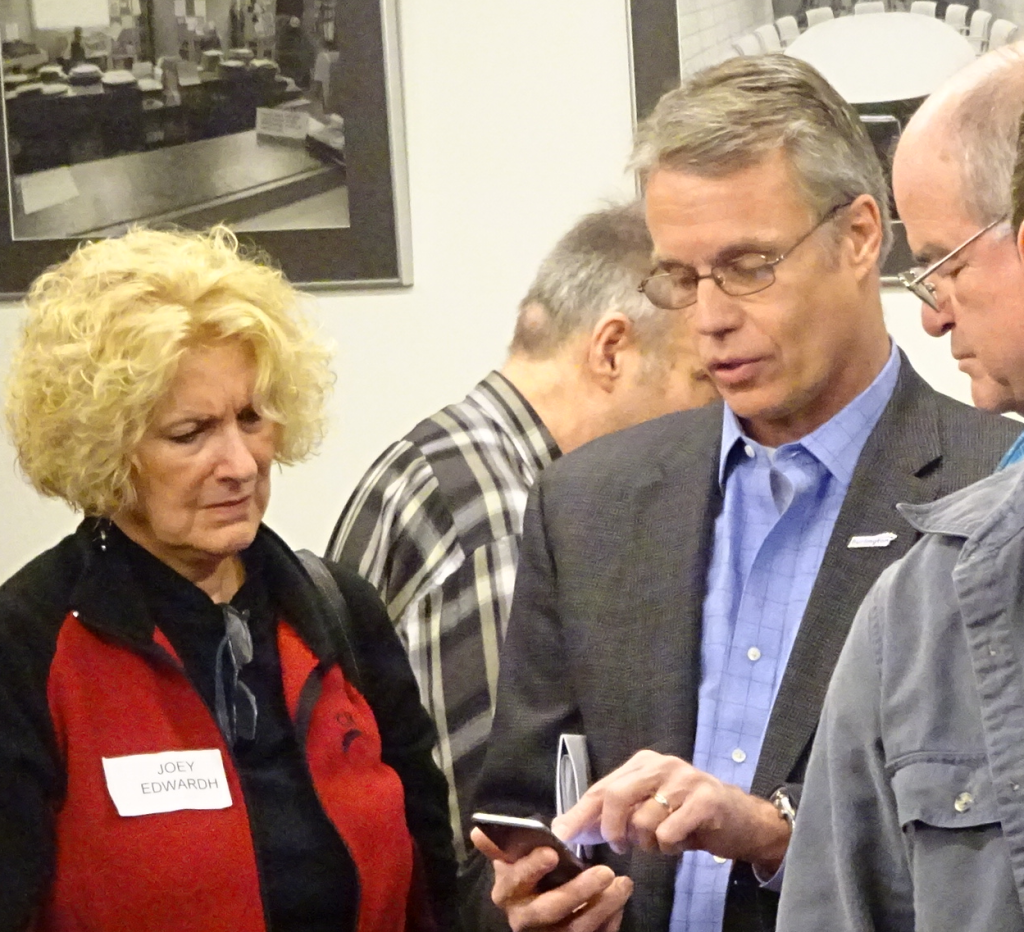 Mayor explains using the bus schedule on his cell phone Riders are forced to find some other way to get around – and they often like what they find – even if it costs more and they stay with it for some time.
There is a break in the trust that existed between the transit drivers and those who use the buses.
People who depended on transit had their lives significantly disruptedand they don’t see their transit driver as the friendly person who they met and chatted with every day.
There is a disintegration in public trust – something that is hard to quantify or measure but it is certainly there.
Burlington is not a transit friendly city. There are people who will be delighted when the bus no longer drives by their house making more noise than they want to put up with.
Those same people don’t like the noise the garbage truck makes but they put up with it because they want their garbage removed.
They are not transit users and they resent the amount of their tax dollars that are used to support transit – they see transit that is something for people of limited means – and they don’t see Burlington as a city of limited means.
This attitude is part of a particular demographic – it isn’t seen in the younger people – they adapt more easily and tend to have a different take on the damage that cars do to the environment.
It will be interesting to see what the transit workers decide to do and how city council reacts.
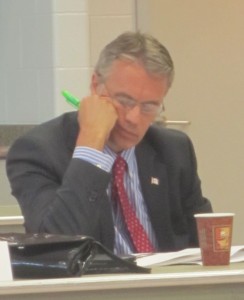 Mayor thinking through a problem – transit is going to occupy some of his thinking this weekend. 
 By Pepper Parr By Pepper Parr
July 2, 2015
BURLINGTON, ON
What have we managed to do as a country in this past 148 years? Stay together is perhaps the biggest part of our success as a country.
Getting the Maritime provinces and what was then the Province of Canada to agree to form a confederation in 1867 was propelled to a considerable degree by the Civil War the Americans were fighting at the time.
 Fathers of Confederation negotiating in Charlottetown, Prince Edward Island. Once Confederation took place Ontario and Quebec were created and the task then was to bring in the rest of the country – everything west of Ontario
We didn’t get Newfoundland into confederation until 1948.
Then in 1995 Quebec missed leaving the confederation by less than 50,000 votes. They had failed to separate in 1980 as well. Many feel the issue of Quebec becoming a spate country is now behind us – we certainly won’t fight that battle for another twenty years. And who knows what kind of a country we will be then?
We are now an ethnically diverse country. An aggressive immigration policy has moved Canada from a French and English country to one that has people from every imaginable country.
We have in the past shown the ability to bring in tens of thousands of people who faced disasters in their own country. The “boat people” from Vietnam was perhaps one of our best moments as a compassionate caring people.
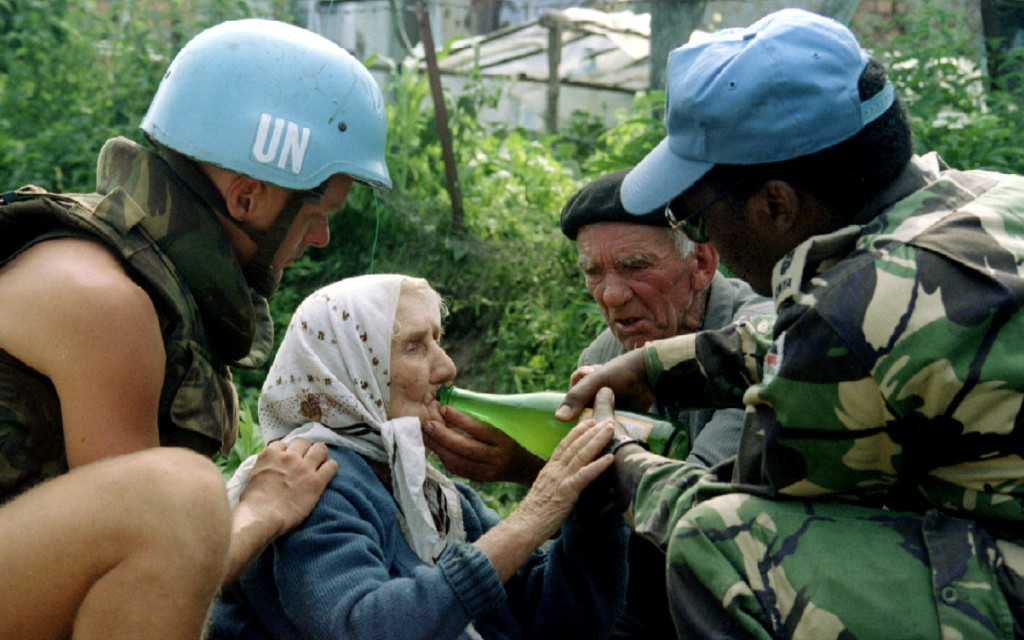 United Nations Peacekeepers were the result of a Canadian resolution at the UN. Were respected leaders then. The creation of the United Nations Peace keepers was another proud significant time for Canadians.
We have been a country that has gone to war when we felt it necessary – and came close to fracturing the country when Quebec saw both the first and the second world wards differently than the rest of the country.
We overcame those difficulties as well.
We have not become known as a country with strong environment positions. We have failed to live up to the various accords we have signed.
 Some of the dirtiest oil on the planet comes out of Alberta We mine and ship some of the most toxic oil this planet has seen; some of that oil will in the not too distant future run through a pipeline at the top of this city.
Why Canada is not a leader in the environmentally sound refining of the tar sands oil is a national shame. It is the federal government that holds all those cards.
John Kennedy made America the world leader in space exploration when he said they would put a man on the moon in ten years. It became a mission for that country and they succeeded.
Imagine if our federal government did the same thing with the oil in Alberta? We could have billions of barrels of oil flowing out of the tar sands and into refineries and transported around the world.
There is more oil in our tar sands that there is in the ground in Saudi Arabia – we are an oil rich nation but we insist on selling dirty oil to people that need oil badly.
We have not been as judicially sound as we have been in the past. Our Supreme Court is constantly at odds with the federal government.
We have treated our aboriginal people very poorly in the past and are still doing so to this day. Changes are beginning to take place but the price aboriginal people have had to pay while the rest of us began to learn and understand how badly our governments treated these people has been very high.
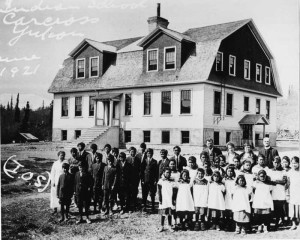 To our everlasting shame – we did this to our aboriginal people – some thought we we doing the right thing. Most people didn’t even know what was being done. Many aboriginal communities are seriously dysfunctional and we blame that dysfunction on the racist belief that these people are not ready to govern themselves. We have been wrong in the past and we are wrong now.
Some of our police forces are beginning to look a little like those south of the border. We treat our criminals so badly that they remain criminals for as long as they live. Punishment is part of behaviour change but there are limits which our federal government doesn’t appear to understand – they just keep opening up more prisons and treating those in prison in a manner that all but guarantees they will return soon after they are released.
And we spend a princely sum to keep convicts in prisons but won’t spend an amount anywhere near on a national day care program.
As a society we have yet to realize that no one was born a murderer or a bank robber – the society we are played some part of what happened to turn an innocent into as criminal.
 As we move closer towards a critical election in just over 100 days this might be a good time to reflect on the Canada you want and which government you believe will get us all there. As we move closer towards a critical election in just over 100 days this might be a good time to reflect on the Canada you want and which government you believe will get us all there.
In two years we will have been a country for 150 years – will we be different then?

 By Staff By Staff
June 30th, 2015
BURLINGTON, ON
What does $50 million worth of red tape look like?
If you’ve ever had to fill informs for any government agency – city hall for that matter – you know what I’m talking about.
In a self-serving media release the province announces that it has streamlined services to help businesses succeed and grow and that this has led to $50 million in savings and 2.4 million saved hours for businesses across the province in the last four years.
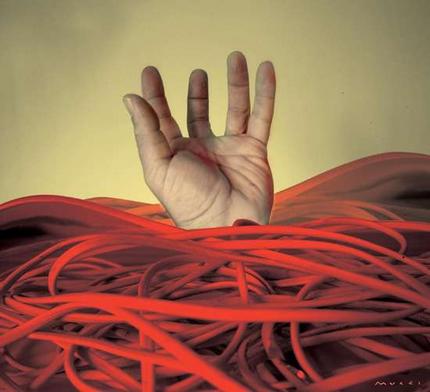 Business people and citizens drown in red tape while the bureaucrats keep making more of it. They have forms you need to order forms The idea is to reduce unnecessary regulatory and administrative processes that cost businesses time and money. The report features 28 initiatives across government that are modernizing services and making it easier for businesses to succeed, including:
• Creating a new online system for processing payments for the Ministry of Health and Long-term Care’s Assistive Devices Program — reducing wait times for payments and saving registered vendors $16.7 million and an estimated 500,000 hours over four years.
• A new, convenient online compliance check tool available to businesses with a good track record, as an alternative to full inspections under the Employment Standards Act,- saving these businesses an estimated $725,000 and 36,500 hours over two years.
• Streamlining regulations and processes with the Ministry of Transportation’s simplified testing requirements for senior commercial drivers to renew their licences — saving drivers $1.87 million and an estimated 57,000 hours over a year.
 This could be the logo that could be printed on T-shirts that bureaucrats could wear – that way we would know who they are. Ontario has set a target of reducing burdens to save business $100 million by the end of 2017. With $50 million of savings so far, our province is halfway to reaching its target. This is part of our government’s broader strategy, aimed at reducing unnecessary burdens to businesses across Ontario. Since 2008, our government has eliminated more than one in six regulatory requirements – or 80,000 regulatory burdens, leading to more efficient, streamlined processes.
And if you believe all this – there is a nice parcel of land in Florida I would love to sell you.
What I want to know is – how many civil servants did the counting of all those hours that were saved?

 By Ray Rivers By Ray Rivers
June 26, 2015
BURLINGTON, ON
I have a friend who would like nothing better than to see all political parties banned. Representatives should follow the wishes of the people who elected them, not be desk-thumping seals obeying the every whim of the prime minister and his entourage. For him, Canada’s federal government, with its powerful leadership clique and strict party discipline, best resembles a limited autocracy.
 The signing of the Magna Carta – the document that began the process of taking power away from Kings But is partisanship the culprit? Political parties are the wheels that have been driving the evolution of the democratic form, excepting the obscure Greek experiments with direct democracy. Not to downplay the importance of the Magna Carta, it was the Whig (Liberals) party in Britain which wrestled autocratic executive power away from the King, and brought us our modern parliamentary template.
So, perhaps, the issue has more to do with leadership style than governance structure. And, in that vein, my friend likes to blame Pierre Trudeau. He says that PET initiated the style, adopted by subsequent leaders, of absolute control over public policy and decision-making. And he is even more critical of Mr. Harper, who makes PET look like a wuss in this regard.
Ontario Tory back bencher and maverick, Michael Chong, finally got his private member’s Reform Act through the system. Chong held a couple of ministerial posts in the 2006 Conservative government before quitting Cabinet in disgust over the ‘Québécois nation motion’. Having doomed himself to eternal back-benching by his action, he then focused his creative juices on reforming the party system to rein in the near absolute power of party leaders.
I’ve never been a fan of government writing laws to regulate its own behaviour. Laws like the Mike Harris balanced budget legislation and the latest federal copycat version of that are good examples of bad legislation. Unworkable, impractical and unnecessary, there are enough holes in that federal budget law for the PM to drive a Mack truck through – as he did with his fixed elections date law.
I always figured that budgets were what we paid the government to sort out in our best interests. It’s their job, why do they need a law? And this so-called Reform Act is about how the party’s rule themselves. Mundane matters like selecting caucus chairs and nominating candidates are the stuff of this bill. Well, at least that is all that was left, after his own party got through with it.
Let’s remember that political parties are already governed under the Elections Act and by Elections Canada. There are stiff penalties for misdeeds, as Harper’s protege and former spokesperson, Dean Del Mastro, recently discovered. He is the winner of a month’s free room and board in the ‘Big House’ for breaking campaign spending rules and trying to cover it up.
When Justin Trudeau heard about potential sexual misconduct by two of his Liberal MPs, a while back, he immediately suspended them from his caucus. Under the Reform Act he now would not be able to do that without jumping through a bunch of hoops and hurdles. You be the judge if that makes us better off – but it sure did tick off Chong’s boss, and that may have been his main point.
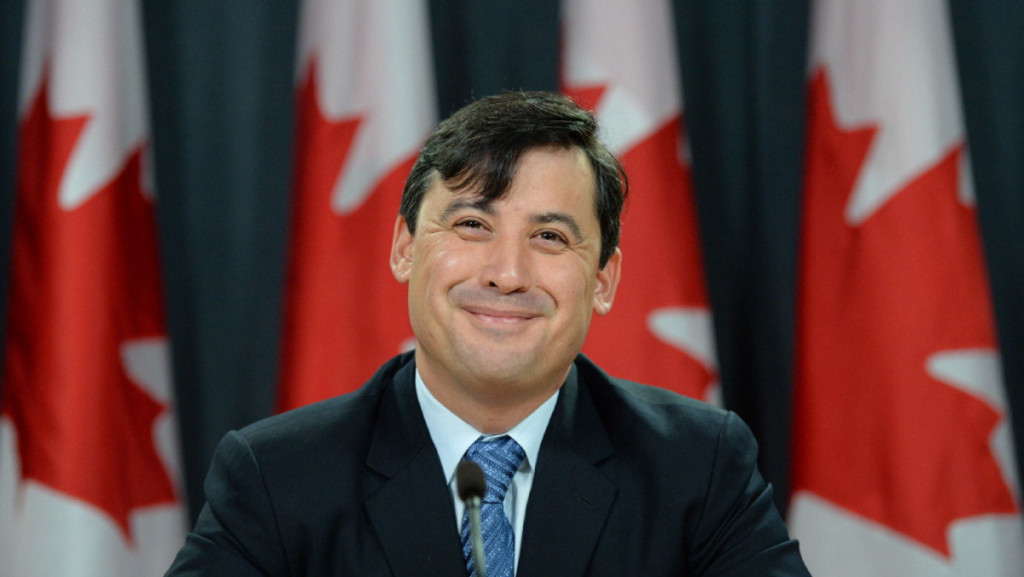 Conservative MP Michael Chong introduced a bill that would give party caucuses significant powers – including the ability to vote out their leader – and it was actually passed by the House of Commons. Chong, not only had to grovel to get this bill past his own party members in the House of Commons, but almost lost it in the Senate, where one Conservative senator threatened to kill it. Meanwhile the opposition parties were rubbing their hands and cheering him on. That tells us as much about the legislation as it does them.
And Mr. Chong objected to the bill being sent to the Senate, given that it only concerned procedures in the House of Commons, and the Senate has no authority over the lower house. Besides the Senate is a mess and has become a laughing stock. That institution can’t even manage itself let alone pass judgement on what goes on among MPs in the House of Commons.
It’s not just Duffy, who is still on trial, but all the other scoundrels scarfing down all the goodies to be snatched from the public trough. The person most likely to put Canada’s Senate out of its misery, the high polling NDP leader Mulcair, hasn’t announced whether that will be on his election platform this fall. But he and Saskatchewan’s premier Wall are sure making a lot of noise.
Interestingly Mr. Trudeau has taken the party out of the Senate, at least if they call themselves Liberals. That sounds a lot like what my friend was craving – replacing the thumping seals with non-partisan representatives. Except they’re not really representatives – don’t really represent anyone but themselves.
So long as senators are unelected, they will always be seen as patronage appointments – whatever their political colour. On the other hand, an elected Senate would compromise parliamentary decision-making, as indeed moving to an elected Senate has done in the USA. So more Canadians are coming to accept that it may not just the bath water, but this baby, which needs tossing out.
As for Chong’s law, it prescribes no new penalties, so the Election Act and Parliament of Canada Act are the fall backs. But I doubt Mr. Trudeau or Mr. Harper would serve jail time for expelling the next delinquent MP without having first put it to a vote in caucus. I’d give him a B+ for his good intentions, an A for effort and a C for the actual bill.
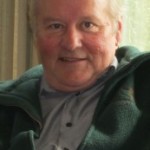 Ray Rivers writes weekly on both federal and provincial politics, applying his more than 25 years as a federal bureaucrat to his thinking. Rivers was a candidate for provincial office in Burlington where he ran as a Liberal against Cam Jackson in 1995, the year Mike Harris and the Common Sense Revolution swept the province. Up until yesterday Rivers was president of the Flamborough – Glanbrook federal Liberal Association. We could not have a president of a federal constituency association writing an opinion column on the upcoming federal election – Rivers resigned the presidency of the association last night and will take a break during part of July and return in August – unless of course there is some breaking political news that stirs him from his summer slumber. Ray Rivers writes weekly on both federal and provincial politics, applying his more than 25 years as a federal bureaucrat to his thinking. Rivers was a candidate for provincial office in Burlington where he ran as a Liberal against Cam Jackson in 1995, the year Mike Harris and the Common Sense Revolution swept the province. Up until yesterday Rivers was president of the Flamborough – Glanbrook federal Liberal Association. We could not have a president of a federal constituency association writing an opinion column on the upcoming federal election – Rivers resigned the presidency of the association last night and will take a break during part of July and return in August – unless of course there is some breaking political news that stirs him from his summer slumber.
Background links:
Chong’s Law Opposition Support Passing Chong’s Law
Trudeau’s Law Mulcair’s Law Harper’s Law

 By Pepper By Pepper
June 26, 2015
BURLINGTON, ON
Some people in each community listen carefully, ask probing questions and trust their member of Council to keep them up to date on what is happening in their community and to protect the best the community has.
Every member of a city council has their own unique style; something that defines who they are and the way they see their job.
In Burlington there are a number of different political styles. Councillor Marianne Meed Ward was once out on Christmas Day picking up garbage when a resident called her t complain.
During the flood last August Ward 4 Councillor Jack Dennison walked into hundreds of basements to personally see the damage done.
Ward 5 Councillor Paul Sharman put his heart on his sleeve when her spoke to a group of Rotarians during the Rubfest launch and pleaded for help for the people in his community.
Ward 3 Councillor John Taylor doesn’t hold meetings for his constituents – they are more like family get togethers – he has been in office that long.
 Blair Lancaster – almost holding court with her constituents at a corn roast. Blair Lancaster in ward 6 tends to have two different public styles; one that gets used for those south of Dundas and another that gets used when she is politicking north of Dundas; there is nothing duplicitous ion this approach – she is dealing with two different mind sets and adjust her message to meet her understanding of each community.
Ward 1 Councillor Rick Craven, who gave up talking to the Gazette when we wrote something about him he didn’t like, held a community meeting.
Last Wednesday evening Councillor Craven held a community meeting to talk about the 324 townhouse project on Masonry Court being developed by the ADI Group. It wasn’t a particularly unpopular project – the meeting didn’t cheer when the presentation was over – they just thought the developer could do something that was more “livable” and “imaginative”. “Not very creative” was the most stinging comment. He was speaking to an audience of about 40 people who were for the most part involved in their community and wanted to know more.
Councillor told them that the population of Aldershot had grown by just 4000 people in the last 15 years and that without more in the way of growth the chances of there ever seeing a grocery store in the west end of the community were very slim.
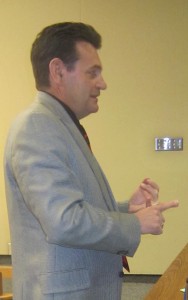 Rick Craven: Best committee chair the city has; not big on the warm fuzzy stuff through. Needs a hug badly. 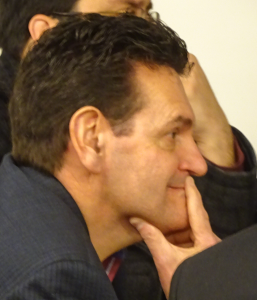 Ward 1 Councillor Rick Craven – seems to have forgotten everything he knew about the ADI project on Martha at Lakeshore Road. The meeting was just like most community meetings in Aldershot; people listened and asked questions and for the most part got fair answers.
Until ..
Until one woman asked the speaker from the ADI Group to tell her a little about the company – she’d never heard of them before.
The company representative told their story – sort of. He skirted totally the situation with the 28 storey application that ADI had made to the city for an application at the corner of Martha and Lakeshore Road which the city and planning department was completely against – including Councillor Craven.
 The ADI Group’s 28 storey development proposal on the downtown core was not mentioned at a meeting about their Masonry Court development. The rules that govern development applications are such that if the planning department doesn’t do something with an application the developer can take their case to the Ontario Municipal Board. Burlington city council didn’t get to vote formally on the project within that 180 day window.
On the 181st day ADI had taken their case to the OMB.
The project is one that the city feels is a mistake from a development point of view and has been consistently vocal about.
But not a word about this issue from Councillor Craven when a constituent asked to know more about the company.
Councillor Craven had an obligation to tell his constituents that there was a problem with a major ADI development application and they were playing a very sharp game – albeit within the rules of the game.
Craven’s behavior gives a whole new definition to politicians being in bed with developers.
Background links:
Aldershot community meeting Wednesday June 23rd, 2015
Full profile on ward 1 Councillor.
Councillor chooses not to represent his constituents; property expropriated.

 Ray Rivers Ray Rivers
June 19. 2015
BURLINGTON, ON
“If I didn’t think he was ready I wouldn’t have stepped aside,” former interim Liberal leader Bob Rae noted. He was speaking at a gathering of Flamborough-Glanbrook Liberals Thursday night in the intimate Cafe Troy in West Flamborough. Of course, Rae was referring to the recent Conservative attack ads aimed at Justin Trudeau, as he addressed the crowd who had come to support local federal candidate Jennifer Stebbing.
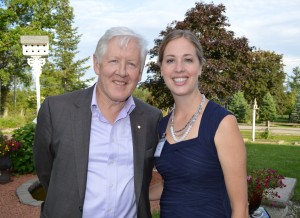 Flamborough-Glanbrook Liberal candidate Jennifer Stebbing with Bob Rae Thursday night in the Cafe Troy in West Flamborough. As I introduced the former Liberal interim leader and provincial Premier, rhyming off his numerous accomplishments, I couldn’t help thinking how perfectly qualified he would be to help navigate Canada’s political waters should there be an impasse after the election this October. A three party split could well see the Conservatives run up through the middle of the two centre-left parties, but I’m betting on another parliamentary minority.
In 1985 Bob Rae’s third place NDP crawled into bed with David Peterson’s second place Liberals, to give birth to the first non-Tory Ontario government in over four decades. Their two-year fling ended in grief for the NDP, though that party gained considerable credibility and was well positioned for its first ever Ontario majority in 1990.
At the end of 2007 when Stephen Harper’s minority Conservatives were facing parliamentary revolt over the economy, the two national opposition leaders, Jack Layton and Stephan Dion, formed a coalition aimed at removing him. Harper survived by shutting down Parliament until he could persuade Canadians he had changed his economic policy, and the once-eager coalition partners had cooled their jets.
Once again it was Bob Rae who was given the job of picking up the pieces of the stillborn coalition idea. However, enthusiasm for any kind of coalition with a third party had soon dissipated as Liberals reaffirmed their determination to regain a majority on their own.
There is no certainty over where this year’s October election will land us, and for that reason alone, it may be the most interesting election in modern Canadian times. Bob Rae speculated that, like what we saw in Alberta last month, many voters are fatigued, tired, disillusioned and bored with the status quo, and looking for a change. And that means either or both of the opposition parties could benefit.
The Conservatives have been ramping up their advertising, burning up our taxpayer dollars, as sitting governments running on their record are wont to do. They can be expected to re-announce existing programs in an attempt to project an air of progress into their campaign. This was evident when they recently announced some previously allocated infrastructure money for Toronto. And of course the attack ads will continue, though they may shift onto the NDP, providing Mulcair keeps polling this well.
In the context of this electoral uncertainty, Mr. Trudeau has announced his latest tranche of policy, this time improving our imperfect democracy by changing how we elect our members. The Greens and NDP have long advocated changing to a more representative system of electing parliamentarians, though Canadians have so-far rejected proportional representation.
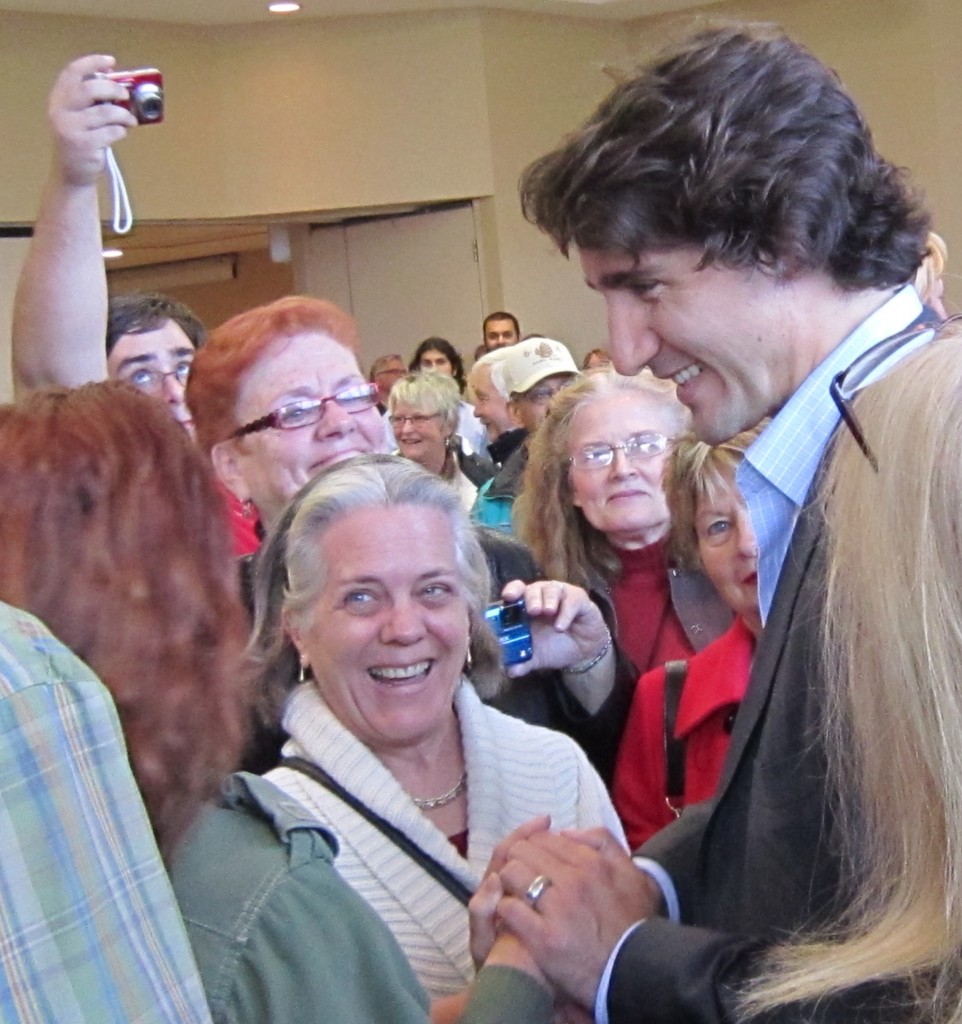 It hasn’t reached a fever pitch yet – it might not but he does know how to pull all the heart strings and both his hair and his children get many mentions. The bold new ideas? – haven’t heard those yet. what he did assure his audience was that he had very solid values – but didn’t make much mention of what they were. Picture taken when Trudeau was last in Burlington – the hair is shorter now So ranked or preferential balloting may be in the cards if Trudeau’s party wins the election. That would ensure that all MPs have been elected with at least 50% of the vote as a first or second choice. And that would mean that the party in power would have been elected with the support of at least half of all Canadians, compared to the thirty-something percent the Conservatives got in the last election.
With the Conservatives opposed to anything but first-past-the-post, there would need to be a Liberal, NDP or Liberal-NDP government to change the system. And that may be where Mr. Rae comes in, if he is invited to help put a centre-left coalition together to bring about electoral change. After all, he’s been there before. Who knows the two parties better?
 Ray Rivers writes weekly on both federal and provincial politics, applying his more than 25 years as a federal bureaucrat to his thinking. Rivers was a candidate for provincial office in Burlington where he ran as a Liberal against Cam Jackson in 1995, the year Mike Harris and the Common Sense Revolution swept the province. Ray Rivers writes weekly on both federal and provincial politics, applying his more than 25 years as a federal bureaucrat to his thinking. Rivers was a candidate for provincial office in Burlington where he ran as a Liberal against Cam Jackson in 1995, the year Mike Harris and the Common Sense Revolution swept the province.
Background links:
Bob Rae Mulcair Government-In-Waiting Trudeau Open Democracy
Tories Advertising Tories Infrastructure /

 By Ray Rivers By Ray Rivers
June 12, 2015
BURLINGTON, ON
“Mr. Putin runs an entirely different system … he runs an economy that is dominated by oligarchs and criminal syndicates. It is not at all like our economy, it doesn’t share our interests, it doesn’t share our values, and so I think we need to have discussions where we can really rally the shared interests of the Western democratic world.” (CBC).
This was one of Canadian PM Stephen Harper’s clearest foreign policy statements.
Cynics might say that he is just catering to the Ukrainian diaspora in Canada – playing politics from abroad in an election year. But he has been consistent on this issue from the get-go, and as such, brings a constructive voice into the mix of confusion over how to solve a problem like Putin.
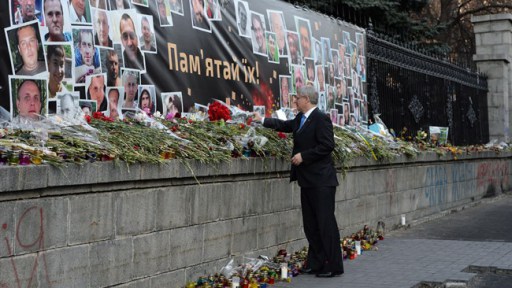 Prime Minister laying a wreath at a memorial in Kiev. Notwithstanding his refusal to back up his aggressive stand by supplying defensive weapons, Ukrainian leaders have no greater friend than Canada’s Prime Minister. And his voice has apparently influenced decision-making at the latest G7 meeting in Bavaria, where unanimous consent was obtained to keep economic sanctions on Russia.
The G7, established in 1975 as the Group of 6 (G6) is comprised of the chief financial officers and heads of government of the USA, UK, France, Germany, Italy and, as of 1976, Canada. The G7 can claim to be global power brokers since they represent the majority of the planet’s economic power and wealth.
Canada was an after-thought addition to the original club. We represent the smallest population and economy of the group, though we can boast the second highest per capita GDP and human development index rating. This G7 group is not to be confused with the G20, which includes the G7 as well as other big nations, and collectively controls about 80 percent of global wealth. And as if it were not confusing enough, the European Union established another G5 (now G6) in the nineties.
Russia became a member of the G7 sometime after the disintegration of the USSR, making it the G8, but was kicked out last year after it invaded the Ukraine. Although it’s economy is slightly greater than that of Canada, it’s GDP per capita is only a third of ours – a developing-nation standard of living. That and the other arguments Mr. Harper’s raised are good reasons for its expulsion.
 Would returning to the Gold standard make a difference? The G7 was originally constituted to deal with the aftermath of the US leaving the gold standard. But the Group of Seven have evolved into a forum to discuss economic and trade issues, such as the pending credit default by Greece. Still, when you get a bunch of chief executives from the world’s most powerful nations together, they’ll talk about whatever they want.
So in addition to Greece, the Islamic State (IS), Ukraine and Climate Change were on the agenda. German Chancellor Merkel was passionate about making climate change a priority. France hosts the next global climate change conference at the end of this year, and was hoping the G7 would support something like zero emissions by mid-century.
Japan and Canada, for different reasons, were not ready to sign onto a resolution to stop burning fossil fuels by 2050. So they picked a date, out of thin air, and the rest of the members compromised with 2100 – the lowest common denominator. Well, at least, I won’t be around to criticize the PM, should he miss that target, But neither will he – and that is the point. He might just as well have chosen 2200 or 2300 – it means nothing.
The Ukraine and IS conflicts are serious business. Almost 7,000 people have been killed over the last year in Ukraine, and there are unfounded claims of 10,000 deaths from the US-led bombing alone. There is lots of wrong doing, illegality and immorality to go around, and two sides to every story, but we are the good guys, right?
So what about climate change? The World Health Organization estimates a quarter million deaths annually between 2030 and 2050 and economic costs of up to $4 B a year as a result of this phenomenon. As fixated as we are on Ukraine and IS, isn’t this a bigger picture? Or is there something amiss with our values and interests? I mean, how moral is inter-generational inequality?
Mr. Harper’s European vacation included a ten minute meeting with the Pope, whose office claims to be the pinnacle of morality. Our PM has been asked, by our first nations to give the Pope a message, to apologize for what his church, among others, did to Canada’s aboriginal residential students.
But Harper didn’t ask, choosing to continue his tirade on Russia instead. Pope Francis is a bit of a rock star, and who knows, he might have apologized. No doubt he had already lectured Mr. Putin about the morality of the Ukraine conflict when they met a day earlier.
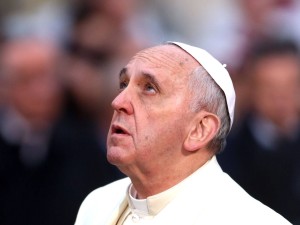 Pope checking on the heavens – just how polluted are they? The next big campaign for the Pontiff is fighting climate change. So it is likely this topic came up in his discussions with our PM, but he’s not saying. The Pope has many allies in this battle to save the planet as we know it, including the US and Chinese leaders, and the Europeans.
Mr. Harper would do well to ponder the words he used to describe the Russian leader – the ones about interests and values and belonging to a club that shares values. Should he be re-elected PM later this year, those very words may come back to haunt him, as he finds himself lonely if not alone, in Paris, at the climate change conference.
 Ray Rivers writes weekly on both federal and provincial politics, applying his more than 25 years as a federal bureaucrat to his thinking. Rivers was a candidate for provincial office in Burlington where he ran as a Liberal against Cam Jackson in 1995, the year Mike Harris and the Common Sense Revolution swept the province. Ray Rivers writes weekly on both federal and provincial politics, applying his more than 25 years as a federal bureaucrat to his thinking. Rivers was a candidate for provincial office in Burlington where he ran as a Liberal against Cam Jackson in 1995, the year Mike Harris and the Common Sense Revolution swept the province.
Background links:
Harper on Russia Harper and Climate Change G20 G7
Harper and Carbon Taxes Putin and the World ISIL Conflict
Climate Change Costs AFN and the Pope
Pope might talk to Harper about pollution

 By Pepper Parr By Pepper Parr
June 6, 2015
BURLINGTON, ON
Just two weeks away from PRIDE week in Toronto, the Halton Regional Police are jumping the gun and declared they are proud to celebrate our diverse LGBTQ+ community and are excited to support and participate in the Pride Parade with a newly decorated police SUV.
The Halton Regional Police Service has built strong partnerships with our LGBTQ+ communities within Halton and in particular, with Marcus Logan, Supervisor, LGBTQ+ Education and Support Services for the Positive Space Network in Halton as well as the Reach Out Centre for Kids (R.O.C.K.)
 On Sunday June 28, 2015, a significant number of service members will be attending the PRIDE parade to march alongside our decorated cruiser. We look forward to joining many other police and emergency services, coming together to support, encourage and promote inclusivity for our LGBTQ+ community. On Sunday June 28, 2015, a significant number of service members will be attending the PRIDE parade to march alongside our decorated cruiser. We look forward to joining many other police and emergency services, coming together to support, encourage and promote inclusivity for our LGBTQ+ community.
In addition, our PRIDE cruiser will also be featured at the Halton pride event that is scheduled to take place on Saturday August 15, 2015 at Central Park in the City of Burlington.
“My long standing partnership and collaborative relationship with the Halton Regional Police Service is one that I am sincerely proud of. The PRIDE cruiser is more than a gesture of inclusion; this is a visible commitment to the ongoing diversity and inclusion work both our agencies are doing together in Halton.” says Logan. “I remember the first time we saw the pride flags flying across Halton, it was such a hopeful and moving sight. The PRIDE cruiser has evoked those feelings in me once again and I am sure that our LGBTQ+ youth and families and allies will experience the same when they see the PRIDE cruiser in their community.” – Logan
I always thought Burlington didn’t want to be like Toronto. At least now we know where some of our tax dollars go,

 By Ray Rivers By Ray Rivers
June 5, 2015
BURLINGTON, ON
Andrew Coyne sums up Peter MacKay pretty well – “a politician of many titles but little achievement.” Considering his personal use of a military helicopter, his ongoing war against the Supreme Court and Canada’s constitution, his is an unenviable record.
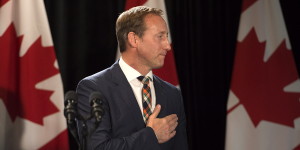 Federal Justice Minister Peter MacKay announces his resignation in Stellarton, N.S on Friday, May 29, 2015. MacKay, the MP from the riding of Central Nova, was first elected in 1997. And now MacKay joins a pack of up to 30 Conservative MPs who are planning to jettison the good ship Tory, just to cash in on their early retirement bonus before the plan expires. MacKay’s desertion is particularly significant for Mr. Harper since his seat, Central Nova, is considered the last safe harbour for the Tories in Atlantic Canada. His father, Elmer, had once held this riding, giving it up to newly nominated PC leader Brian Mulroney in 1983 in exchange for a plumb patronage job with the Atlantic Development Agency.
Peter MacKay will be best remembered as the man who buried the federal Progressive Conservative Party, selling out to the more extreme right-wing Alliance/Reform/CRAP. In doing so, he broke his promise to ‘red Tories’, like Joe Clark and Scott Brison, who would sooner leave than come on board a vessel they no longer could recognize.
But MacKay, who is closer politically to Stephen Harper than to what his old party actually stood for, was given plum postings by Harper as payment for his treachery.
Today, Harper’s Tories are falling like a lead anchor on the east coast. The Liberals seem poised to clean up come the next election. And interestingly, the NDP are the second choice. But that might change as we see the NDP topping-out the Liberals nationally, according to the latest EKOS poll.
Boosted by the NDP’s sweep in last month’s Alberta election, Mr. Mulcair is trending to outpace Mr. Trudeau’s party. Were that trend to continue, strategic voting – whereby voters hold their noses and vote Liberal to block the Tory candidate – may be in for some re-definition.
Liberalism in Canada, and the US (Democrats), has its roots in the once powerful Whig political movement in Great Britain, going back centuries. It was the Liberals who abolished slavery and created the modern welfare state. Liberal socio-economic policies, developed by great thinkers like Adam Smith, JM Keynes and John Stuart Mills helped shape our modern economies – at least until the neo-conservatives, like Lady Thatcher and Ronald Reagan, stuck their fingers in.
Liberals hold, somewhat immodestly, that they are the party of ideas. But they are also the party of nuance and complexity, making them more challenging to appreciate. For many people Liberals represent the middle ground in political theatre, though some say standing for so many things means they stand for nothing. And unlike the Tories who draw their support from the wealthy, and the NDP which represents labour, Liberals generally lack a loyal socio-economic constituency to call their own.
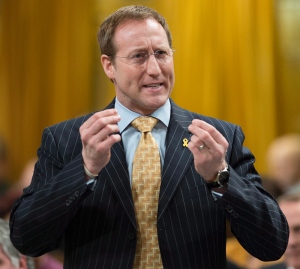 McKay often struggled to make his point. Perhaps for this reason, by the early 1920’s, the British Liberal party had been delegated third party status. Maybe this was a result of the Conservative and Labour party constituencies just following the voting prerogatives of their parties. Or, it might have been an inevitable result of the ‘first past the post’ (FPP) system of electing parliamentarians, a system which works well in a two party system but fails to represent the public in a more diverse multi-party political climate.
Stephan Harper and Jean Chretien each were elected to majority governments with the support of little more than a third of the voting public. In the case of Harper, who has re-united the right, it means that the two-thirds of Canadians, who favour more centrist policies, have and would again vote against him – but he might still win a majority through vote splitting among the other parties.
One option for our political system to better reflect voters wishes might be for the Liberals and NDP to unite as a centre-left coalition, and bring Canada back to a workable two party system. However, that is an unlikely to happen for a number of reasons, including the influence of trade unions in the NDP and the NDP Quebec sovereignty policy. Thus, those wanting to see the end of Mr. Harper will need to vote strategically or accept the consequences.
Alternatively, we could change our electoral system. One option would be to adopt some configuration of the thing called proportional representation, a rather complicated combination of traditional FPP with parliamentary seats also awarded for the popular vote. Most European governments have adopted this approach. B.C. and Ontario held referenda to implement provincial proportional systems a few years back, but the vote failed to pass in each case.
The Green Party has been a big supporter of proportional representation, and there had been much discussion of proportional representation at the last NDP nomination conference, including a potential deal for cooperative voting with the Liberals to pave the way for its adoption.
Another, and less radical approach, would be to offer a preferential, or ranked ballot, for voters in the next election. The voters would rank their choices and the winning candidate would be the first or second choice of at least 51% of the voters. This approach received approval at a Liberal biennial policy conference a few years back. It is also a plan the Ontario government will soon be offering municipalities.
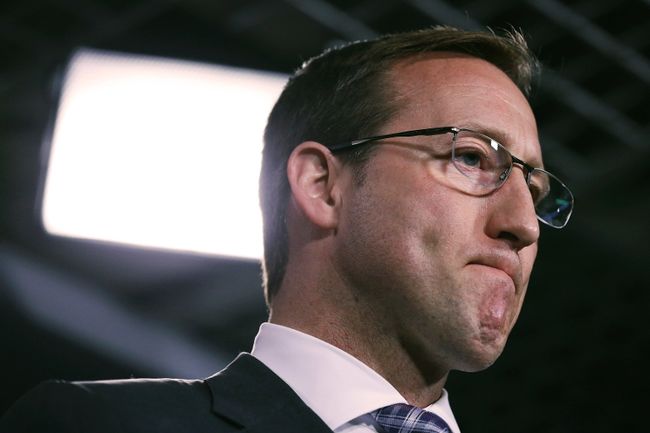 Just going to have to get by on $1 million But Peter MacKaty won’t have to worry about any of this. More than likely his old riding will go to the Liberals in the upcoming election. His early retirement package is worth more than a million dollars so nobody can blame him for running to the bank rather than running in the election. And given his performance as a parliamentarian, nobody will notice his absence.
 Ray Rivers writes weekly on both federal and provincial politics, applying his more than 25 years as a federal bureaucrat to his thinking. Rivers was a candidate for provincial office in Burlington where he ran as a Liberal against Cam Jackson in 1995, the year Mike Harris and the Common Sense Revolution swept the province. Ray Rivers writes weekly on both federal and provincial politics, applying his more than 25 years as a federal bureaucrat to his thinking. Rivers was a candidate for provincial office in Burlington where he ran as a Liberal against Cam Jackson in 1995, the year Mike Harris and the Common Sense Revolution swept the province.
Background links:
MacKay Coyne’s Take MacKay’s Leaving
Peter MacKay Bio MacKay Election MacKay Warmth
MacKay Exit Mulcair or Trudeau British Whigs The Liberal Party

 By Pepper Parr By Pepper Parr
June 2, 2015
BURLINGTON, ON
Last week Regional Council made it a go – the implementation plan that leads up to the development of a bigger, fancier public park is on.
More design work is probably part of the going forward. Which brings up the matter of public involvement in that design.
Other than one public meeting at which the public got to see a bunch of large drawings and some of the detail – the public hasn’t had a chance to say a word about what they think the park should look like.
 The Waterfront Trail Burlingtonians use today will look a lot differently in 25 years – 50 years ago there were railway tracks on the walking path, The park will be a Regional Park and I guess they feel the people in Burlington will just have to put up with whatever the Region’s designer thinks is best.
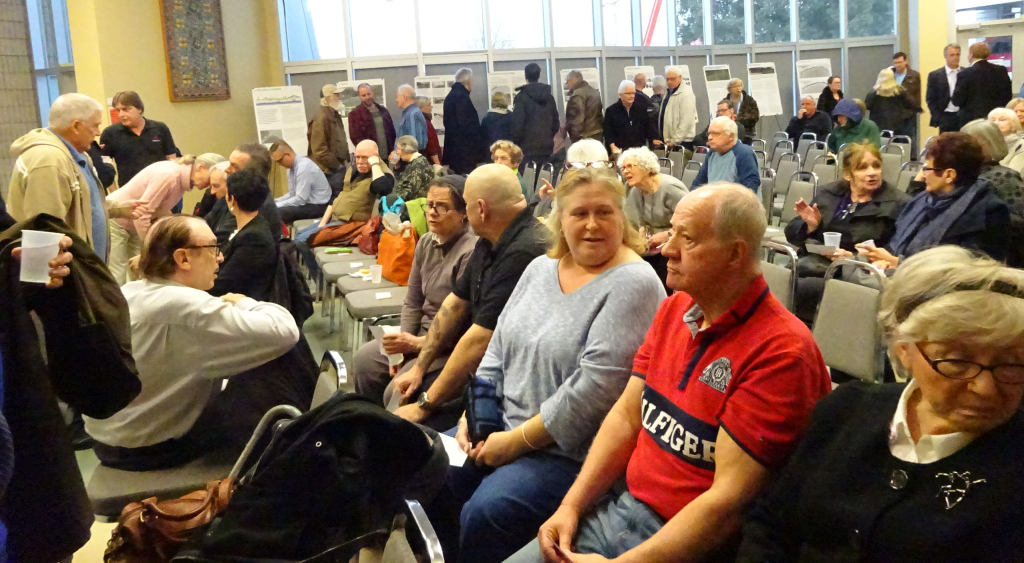 Beachway residents didn’t want to hear much about the park that was planned – they wanted to remain in their homes. There have been problems in getting the public involved. Every time there is a meeting the property owners tend to hi-jack the meeting and ask aloud how the Region can design a park to go on land they don’t own.
The Region responds by saying they are working on that – and indeed they are working at it.
They have put together a very enticing package of financial goodies to get the property owners to sell to the Region.
Incentive Options for Willing Sellers in the Beach includes:
Lease-back Opportunities and Extended Closing Periods:
Life Estates
Relocation Services and Moving Costs:
Environmental Remediation Costs:
Payment Options
Right of First Refusal:
Removal of Fixtures/Chattels
Availability of Halton Surplus Lands
Legal/Professional Costs
Appraisal Costs:
That is an impressive effort on the part of the Region. They have included everything – even the kitchen sink.
We get into the details on each of these “goodies” further on in this article.
 What is pretty close to a shack was one of three properties bought by the Region in the past two years. The incentive package might result in additional sales. The Region has planned on a 15 to 25 year property acquisition time frame Over the past 5 years, the Region has acquired four properties in the Beach area. It is anticipated that additional purchases from willing sellers will be made at a frequency of 1-2 properties each year; they estimate it will take between 15-25 years to acquire the remaining 27 privately held Beach properties on a willing buyer/willing seller basis.
The Beachway residents hate the phrase “willing buyer/willing seller” – they argue that there is just the one buyer and that is the Region. Under those conditions the residents had every right to squawk.
The package the Region has put together is generous and allows for a lot of time for the current owners to live out their lives in the property they own.
Perfect it isn’t but this is not a perfect world.
The recommendation was to implement the strategy immediately. Regional Staff are going to continue to engage property owners in the Beach area to identify additional options that may be made available to willing sellers as the implementation of the Burlington Beach Regional Waterfront park proceeds.
 This property sold for something in the $600,000 range. The owners also got a rental agreement to remain in the home. There was real fear on the part of the residents that they would be expropriated – and when it comes to the bitter end some 25 years from now the Region may have to actually expropriate a hold out. The package that has been put together is as fair as it can get.
Each resident wants to look at the various options and choose the one that suits their situation. It also appears that the Region has decided they will do everything they can to meet reasonable requests – but the park is going to eventually get built.
It would be a better park if there were homes in it – but politically that option is off the table. Given the time frame the Region has to get the park built the political landscape may change – Burlington my get a council that sees the story differently and that Council might manage to find allies in Oakville and change the policy. Some of the homes that are in the way could conceivable be moved.
There are a number of heritage properties in Burlington that would like to find a new location – developers have better us for the land and it would make some sense to move a half a dozen or so heritage properties to the Beachway – include the Freeman Station in that list of properties.
That kind of thinking would certainly create a different park – all it takes is political will to bring about a change.
In order to get some sense of fairness in the talks the Region is talking about creating an index that would be reviewed and revised every three years.
 How does one place a value on a home that is yards away from a noisy expressway on one side and yards away from Lake Ontario on the other side. The Region intends to create an index that will give allow property owners to benefit from the increase in the value of their properties. The index would be a collection of “comparable” homes in south west Burlington that would be used to create a base price for properties. The idea was to come up with something that would allow the homeowners to at least think they would be in on some of the excellent property appreciation that has been taking place in Burlington.
The Burlington Beach Waterfront Park Master Plan implementation will be incremental with the park being fully in place in the next 25 years.
Now that the Plan has been approved, implementation can begin.

 By Ray Rivers By Ray Rivers
May 28, 2015
BURLINGTON, ON
It is easy to become complacent on a sunny spring day in Burlington. It is easy to ignore the cumulative effect that our lifestyle is having on the planet’s climate. But the TV news tell us about the destruction from increasing levels of tornado, storm and flash floods, as we saw recently in B.C. Then there is California experiencing its worst drought ever. It’s all so depressing that you just want to change the channel.
 Developing economies use coal because it is available and it is relatively cheap – we eventually all pay the price. Blame China, Korea and India for their dirty industrialization policies, using cheap dirty coal to fire their economies and take them out of the dark ages and perhaps into a new one. It is ironic and sad that they started burning coal in a big way just as we learned how bad these carbon emission can be for the atmosphere. Of course we in North America, Australia and even Europe still burn coal (though Ontario has eliminated coal power plants). And you can change the channel but that TV was probably made in Korea.
In the last federal budget, Mr. Harper’s election budget, as every other one of his budgets, has ignored our ever increasing contribution to climate change. And we’re not alone. US presidential contenders, Australia’s dinosauric leader and even the leader of once progressive New Zealand have allowed the global commons to slip almost completely off the political page, as they pursue today’s issues without any consideration of tomorrow..
There are people who still think there is a debate about whether climate change is real, a phenomenon psychologists call being in an echo chamber. They have pre-conceived notions that the environment is a conspiracy, constructed by a ’60’s hippie crowd, to take away their freedom… to pollute – so they just listen to themselves. Why shouldn’t we live the way we always did? These folks are watching the ‘Leave it to Beaver’ channel or something on 100 Huntley Street.
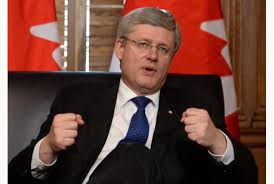 Making a point; speaking for Canadians – is he saying what we want him to say? Canada’s environment minister pulled some imaginary emissions targets out of the air. But without a hint of a roadmap there is no hope of getting there – though perhaps that is the idea? Just like a New Year’s resolution, they’re soon to be forgotten the next day. So why even bother? And besides, these new numbers pale in comparison to the imaginary numbers the Americans and Europeans have generated.
The 21st annual United Nations Climate Change Conference takes place in Paris this coming December. But you can tune out because all expectations are that we’re looking at another failed conference. The only meaningful attempt at global climate cooperation, the 1997 Kyoto Protocol, was critically wounded when GW Bush took the US, it’s chief architect and player, out of the deal only a couple of years later. After all, he has oil in his blood. And Canada’s own wanna-be-oil-man, our PM, whited-out Canada’s signature on Kyoto as soon as he had nailed his majority government.
So this year’s meeting is featuring something called ‘intended nationally determined contributions’ (INDC). These virtually meaningless theoretical voluntary commitments will be offered up by many of the 194 nations in the global climate change game. But since the national targets will be internationally unenforcible, no party will be held to account. So this meeting in the City of Love will not have much to do with love for the environment, or for our children’s children.
It is the ‘tragedy of the commons’ that brings all these nations together once a year, to keep alive the process that requires nothing short of re-genesis. Whether a common pasture, the oceans’ fisheries or the planet’s atmosphere, the ‘tragedy’ can only be abated or avoided through more governance, not less. And that was what Kyoto was all about. Today we have ISIS and an errant Russia gone rogue to add to the mix, so don’t expect any re-runs this year.
Canada’s excuse is that, despite being one of the highest greenhouse gas (GHG) emitting nations per capita, we are still a relatively small part of the global GHG contribution. That is our echo chamber and we’re sticking to it. Canada rationalizes that doing almost nothing is just OK. Inertia has become our climate change strategy. And business as usual, despite occasional lip service to the contrary, prevails, at least at the federal level.
In fairness, the previous Liberal government did little more than sign onto Kyoto with its ambitious targets, which even they would have had trouble to attain – though the Ontario and Quebec governments did. So maybe targets are important. I’ve always believed that it is better to shoot for a high goal and fail, than to have never shot at all. I mean what kind of hockey player goes out on the ice without the prospect of scoring a slap shot on his/her mind?
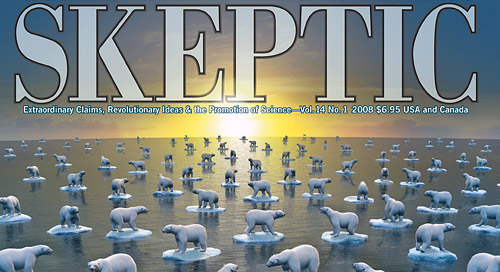 But Canada’s hockey-author, our PM, is just not into the game when it comes to protecting the atmosphere. He was an ardent climate change denier in his opposition days. And his government has stayed pretty true to form on that count. So even if individual Canadians wanted to contribute to the fight against climate change they are leaderless. But Canada’s hockey-author, our PM, is just not into the game when it comes to protecting the atmosphere. He was an ardent climate change denier in his opposition days. And his government has stayed pretty true to form on that count. So even if individual Canadians wanted to contribute to the fight against climate change they are leaderless.
If your national leader is missing in action on this matter, how does a nation mobilize? My New Zealand friend refers to sic critical lost years. We in Canada will have recorded a lost decade, perhaps it is time to change to change the channel.
Background links:
Climate Change Canada
World’s natural Disasters More Disasters Climate Change Echo More Echo
100 Huntley Street Conference Tragedy of the Commons New Zealand
 Ray Rivers writes weekly on both federal and provincial politics, applying his more than 25 years as a federal bureaucrat to his thinking. Rivers was a candidate for provincial office in Burlington where he ran as a Liberal against Cam Jackson in 1995, the year Mike Harris and the Common Sense Revolution swept the province. Ray Rivers writes weekly on both federal and provincial politics, applying his more than 25 years as a federal bureaucrat to his thinking. Rivers was a candidate for provincial office in Burlington where he ran as a Liberal against Cam Jackson in 1995, the year Mike Harris and the Common Sense Revolution swept the province.

 By Pepper Parr By Pepper Parr
May 24, 2015
BURLINGTON, ON
The Gazette got a telephone call from a reader who had made a comment a number of months ago and wanted to know if we could delete the comment.
 We asked why. The caller explained that the person was looking for a job and was worried that someone would do an online search and come across the comment and that it would reflect negatively on that person. We asked why. The caller explained that the person was looking for a job and was worried that someone would do an online search and come across the comment and that it would reflect negatively on that person.
We agreed to delete the comment and did so. Here is the comment that was made.
This article confirms that the current leadership has failed to acknowledge and identify that there is a real problem facing not only the business owners/operators in the downtown area but to residents as well.
The optics of the current situation downtown and leadership model are certainly troubling and the statistics all but confirm, in my opinion, that the current leadership is not up to the task. The failure to adapt has put the future and potential of the downtown area on a disturbing path.
The size of the problem and the associated failure of leadership is extraordinary. I can only hope that those who vote can identify this and make the right decision.
As mentioned before this is my opinion.
 When the leadership of a community invokes this kind of fear – the whole community is in trouble. Leading is best done by consent. When the leadership of a community invokes this kind of fear – the whole community is in trouble. Leading is best done by consent.

 By Mark Gillies By Mark Gillies
May 23, 2015
BURLINGTON, ON
Burlington has the enviable distinction of being located right in the centre of the area known at one time as “the Garden of Canada”. The Village of Burlington at the turn of the 20th century was producing agricultural products that were shipped across Canada and around the world.
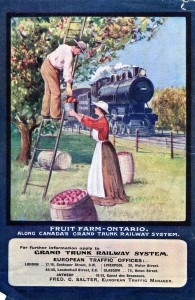 Burlington, and especially the village of Freeman was a very busy place at the turn of the 20th century. Market gardeners used the Grand Trunk Railway to ship their fruit and vegetables out of the area, bound for destinations across Canada and around the world. Market gardeners would line up alongside the tracks at the very busy Burlington Junction train station in Freeman waiting their turn to load their produce on to the boxcars. Today, the historic Freeman train station has been relocated to Fairview Street and is undergoing restoration. Our local farmers were referred to as market gardeners. Most major varieties of fruit and vegetables were grown locally. This agricultural base provided great wealth to the local economy. So, how did Burlington evolve into this status of providing food for the tables of families right around the world?
The answer goes back to this historic date in time, December 16, 1773. On this day, a civil act of disobedience changed the course of history, an event that affected the world right to this day. What happened has become known as the Boston Tea Party, where Samuel Adams and the Sons of Liberty boarded three ships in the Boston Harbor and threw 342 chests of tea overboard, in protest to British rule and taxation.
This resulted in the passage of the punitive Coercive Acts in 1774 and pushed the two sides closer to war. This was the catalyst for the American Revolutionary War which saw approximately one third of the 13 colonies population remain loyal to Britain and the monarchy. During and after the war, Loyalists were seriously harassed, forcing many to leave their homes. Some went to Africa, and founded Sierra Leone, others went to the Bahamas, some families went back to England, while many relocated to Upper and Lower Canada. They were known as United Empire Loyalists.
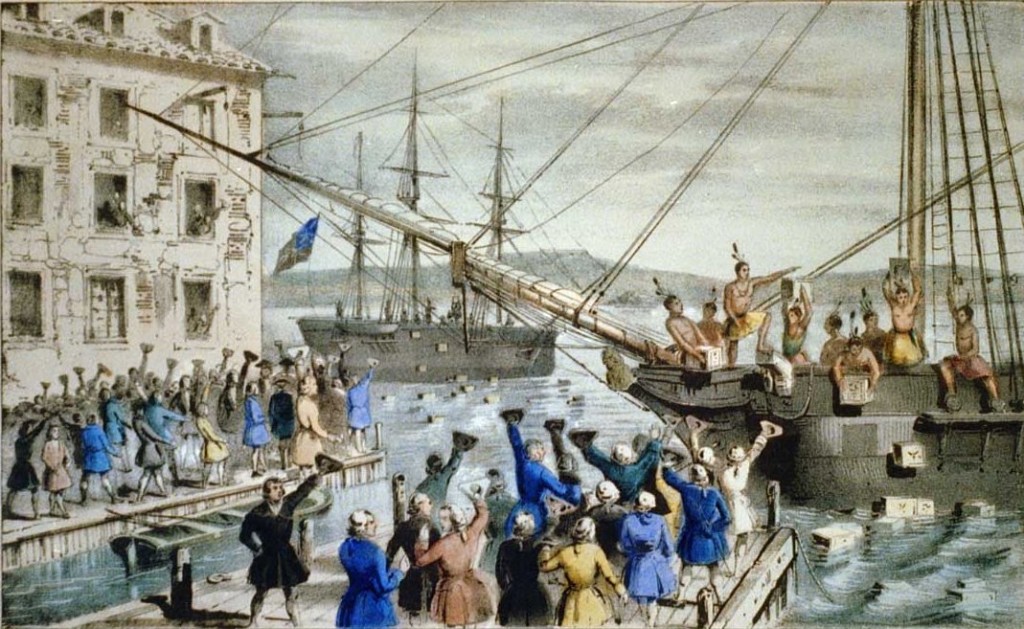 This single act of protest escalated into the American Revolutionary War in I775. Citizens of the 13 colonies were divided between independence or choosing loyalty to Britain. Many loyalists left for Upper and Lower Canada to start over. Burlington and the surrounding areas were major destinations for some of these United Empire Loyalists. So how does this have anything to do with Burlington? Actually, it has everything to do with how Burlington emerged into the city that we enjoy today.
Let’s start with William Alexander Davis who was born in 1741 in Baltimore, Maryland. He married Hannah Phillipse and they owned a plantation in Franklin, Orange, North Carolina. William Davis became quite wealthy and was a loyal British subject. Their neighbours on another plantation were the Gant family.
During the Revolutionary War, General Cornwallis and 2,000 British soldiers marched into North Carolina. The General set up headquarters on the Gant plantation, and the soldiers were sheltered and fed at the Davis plantation. To compensate the Davis family, General Cornwallis issued a “Due Bill” for 10,000 pounds. Among the British soldiers that stayed with the Davis family was a young man by the name of John Graves Simcoe, a soldier with the Queen’s Rangers. A lasting friendship began, which was to have a huge influence on William Davis several years down the road after the war terminated in 1783.
Over the next several years, the Davis family could not properly re-establish their plantation due to continued harassment by the rebels, and the punishing tax system that was enacted on Loyalists. They decided to leave for Upper Canada, where John Graves Simcoe was now the Lieutenant Governor.
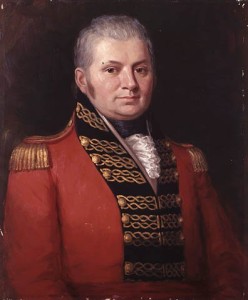 John Graves Simcoe was born in 1752 and died in 1806. He served as Lieutenant Governor from 1791 to 1796. Simcoe was a personal friend of William Alexander Davis, and was instrumental in relocating the Davis and Ghent families to the Stoney Creek area of Upper Canada. The family walked and drove several wagons the entire 800 mile distance from North Carolina to Upper Canada. Included in the entourage were William & Hannah’s seven children. Their one daughter Elizabeth had already married Thomas Ghent, and he also made the trip. (The Ghent name was originally Gant, and it may have been Thomas who initiated the spelling change).
Their trip ended at the Genesee River in Rochester where they stayed over the winter, and in the spring Governor Simcoe upon hearing of their plight, sent a gunboat to pick up the family and their belongings. They were relocated in the Stoney Creek area where Albion Falls eventually became the sight for William Davis’ two mills. The area became known as Albion Mills. This land was the compensation for the Due Bill..
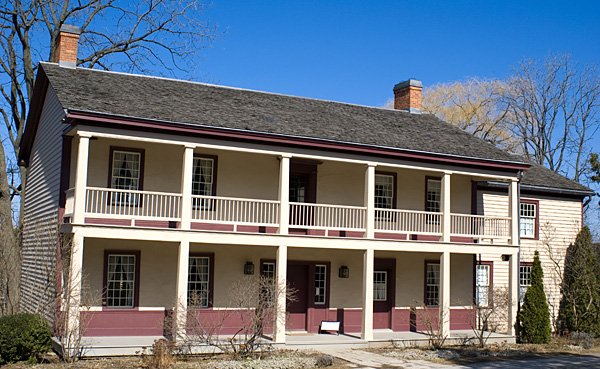 Battlefield House Museum in Stoney Creek was the homestead of James Gage and his family. James married Mary Jane Davis, a daughter of William Alexander Davis. In 1804, Thomas Ghent purchased 200 acres of land from the estate of Joseph Brant, who had been awarded the land as compensation for Brant’s support of the British during the Revolutionary War. The land was called “Brant’s Block”, the area that is now mainly downtown Burlington. Asahel Davis, one of the sons of William Davis and brother-in-law to Thomas Ghent also decided to purchase land from Joseph Brant’s estate.
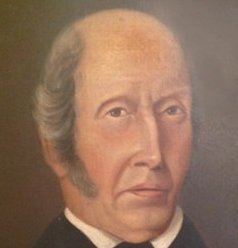 Asahel Davis was a son of William Alexander Davis and the older brother to Mary Jane Davis who married James Gage. And now, we get to the place in our local history where we can see the humble beginnings for “the Garden of Canada”. The Davis and Ghent families had wisely brought fruit seeds from their North Carolina plantations and planted them in the Stoney Creek area where their original farms were located. The young plants were later transferred to the Thomas Ghent and Asahel Davis farms in Brant’s Block. This would officially start Burlington on its way to becoming the focal point for “the Garden of Canada”.
 These two Brant’s Block farms were located in the Plains Road area, west of Brant Street, in an area which later became known as Freeman. Joshua Freeman from Nova Scotia, and his family settled in this area around Brant Street and Plains Road. These two Brant’s Block farms were located in the Plains Road area, west of Brant Street, in an area which later became known as Freeman. Joshua Freeman from Nova Scotia, and his family settled in this area around Brant Street and Plains Road.
Asahel Davis built a couple of homes, and one still stands to this day, but the original house cannot really be seen. The home is called Woodland Terrace, and is located on Plains Road at the QEW. The house was rebuilt in 1883 and became much larger. It was altered by Burlington’s leading house builder of the day, George Blair, for Charles Gilbert Davis, a grandson son of Asashel Davis, and brother to Hannah Augusta Davis.
 Woodland Terrace is a beautiful large historic building on Plains Road located on the eastern side of the QEW. It is still there. Local home builder George Blair added to the original home of Asahel Davis in 1884 for Charles Gilbert Davis, a prominent local market gardener and owner of the house. 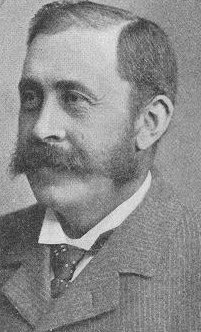 Charles Gilbert Davis was a son of Gilbert Davis. Gilbert was a son of William Alexander Davis. Charles Gilbert Davis was a very successful market gardener on Plains Road. He took his grandfather Asahel Davis’ house and had George Blair build around it to create Woodland Terrace. It was Asahel Davis who donated a corner of his property for the creation of the Union Burying Ground, which is located on Plains Road right in front of the Fortinos and Ikea stores. William Alexander Davis died at the age of 92 in 1834 and is buried in this cemetery.
 The Union Burying is an historic treasure and has been designated as a United Empire Loyalist cemetery. The property was on a corner of the original Asahel Davis market garden farm. It is located on Plains Road, in front of Fortinos and Ikea. Many of Burlington’s earliest settlers are either buried here or at St. Luke’s Cemetery. Asahel Davis had a sister Mary who married James Gage. James was responsible for setting up Wellington Square, formerly known as Brant’s Block. James Street in downtown Burlington is named after him.
Asahel Davis had a son named Gilbert Davis. One of Gilbert’s daughters was named Hannah Augusta Davis. She married Thaddeus Ghent, the son of George Ghent. One of their children was Frederick Davis Ghent, who became the second Mayor of Burlington in 1917.
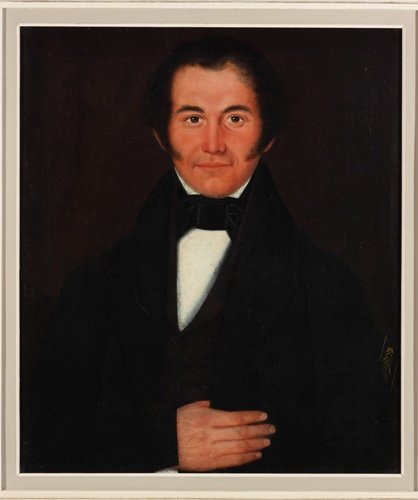 The Reverend David Ghent was a brother to George Ghent and another son of Thomas Ghent and Elizabeth Davis. Rev. Ghent was instrumental in aiding William Lyon Mackenzie’s escape to the United States. Thomas Ghent died in 1824, and his wife Elizabeth Davis died in 1841. Both are buried in the Union Burying Ground.
As a matter of local interest, Thomas Ghent had one son named David Ghent, a man of the cloth, who was responsible for hiding William Lyon Mackenzie during the 1837 rebellion.
Although Thomas Ghent’s house has not survived, one of his other children, named George, also a prominent local market gardener; bought a house on Brant Street that was called Maple “Maple Lodge”.
The home was built in 1854, and credit for the construction of the house goes to Jabez Bent who was a brick maker by trade. It’s probably more accurate to say it was the Bent family of brothers who were responsible for building this house. Jabez had a brother George, who was a mason, and another brother James Cushie Bent who was a carpenter. George most likely was responsible for the foundation, James built the framing, and Jabez manufactured and installed the bricks. As a side note, Jabez is also credited locally with building the stone wall around the Union Burying Ground around 1884. It was probably his brother George who did the work, since Jabez and his family had already moved away in the late.
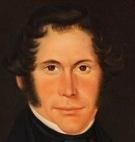 George Ghent, a son of Thomas Ghent and Elizabeth Davis was born in 1806 in Brant’s Block. One of his sons was Thaddeus Ghent, and his grandson was Frederick Davis Ghent, son of Thaddeus Ghent. Fred Ghent was the second mayor of Burlington. George and his second wife Anna Bray lived at Maple Lodge on Brant Street. George’s first wife was Catherine Bates, and she died in 1844. George was a prosperous market gardener. He died in 1883 and was buried in the Union Burying Ground. What’s so significant about the George Ghent house? It symbolizes the entire span of over 220 years as to how Burlington evolved into market gardening and “the Garden of Canada”, an industry that was created from the ravages of the American Revolution, propelling Burlington into world prominence and locally, new found wealth. The George Ghent house should be a national historical monument.
Unfortunately, in 1975 this treasured landmark, was unwisely converted into a commercial property. Mayor George Harrington and his council approved the decision at that time, despite objections from concerned citizens. The beautiful handmade red brick exterior was covered over with an unsightly dull grey paint. The backyard became a parking lot.
Much of the historical architecture internally has been removed or changed. But down deep, underneath it all, the core structure is still with us, after 161 years. This building is a very, very significant part of Burlington’s colourful past. We are so lucky to have it with us.
Would you like to see this historic structure for yourself? The house just recently has become potentially vulnerable, and its survival could be in jeopardy very soon. It doesn’t have an Ontario Heritage Act designation to save it from demolition, and it should have. This beautiful historical property can face demolition without any legal problems. There is nothing in place to protect it.
Heritage Burlington, a citizen’s advisory committee under the chairmanship of James Clemens, has not attempted to designate this house historical. They boast that Heritage Burlington’s mandate is to preserve and conserve our cultural heritage, yet some of their decisions are totally opposite to their own mandate. Heritage Burlington reports to Burlington’s City Council. From some of their controversial past recommendations, Heritage Burlington appears more concerned to see how many true historical properties can be removed from the Heritage Registry, rather than adding them to the list.
I see this as their way to clear obstacles created by heritage buildings that appear to be standing in the way of new construction by developers. Even one of the Heritage Burlington committee members actually is a developer, owns a company that specializes in demolishing old and historical buildings and replacing them with “monster” homes. It’s unbelievable, but true. Does anyone see a conflict of interest here?
Another member of this committee (but does not have a vote) is Councillor Marianne Meed Ward who represents the City of Burlington.
Don’t count on Heritage Burlington for support to protect this historical house. Don’t look to your City Council for heritage support. Our Councillors as a group have a very disappointing track record when it comes to preserving our local heritage. Prepare yourself to see another piece of our incredible history meet the fate of the wrecker’s ball.
For residents living in Burlington, you have most likely driven by this historic treasure countless times, and never gave it a second thought. You should go see it now at 795 Brant Street, located on the southeast corner of Brant and Prospect Streets, before developers attempt to knock it down; probably with the blessing of your City Councillors.
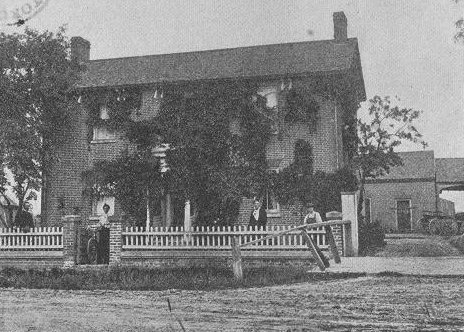 Maple Lodge was built in 1854 by the Bent brothers, Jabez a brick maker, George a mason, and James a carpenter. George Ghent and his family lived for many years at Maple Lodge. The non-designated 161 year old historic home is in jeopardy of potential demolition, due mostly in part to the intensification policy of the Ontario Government. Maple Lodge is located at 795 Brant Street on the south east corner. This is how the home looked in 1902. Today, it is a commercial property. The Brant and Ghent Street corners are up for proposed re-development; the George Ghent house is also clearly in play with a developer assembling the land and getting ready to ask the city for a demolition permit.
This is the kind of damage caused by proposed intensification when it impacts your community. You can lose important parts of your local heritage, oh so very quickly. Once they are gone, they are gone forever!
On May 27, 2015 at the Performing Arts Centre, there will be the second of four public meetings on what the pubic is prepared to accept in the way of downtown development. There will be an opportunity to talk about plans for the Brant and Ghent corners, plus the Lakeshore area of Burlington. You should make plans to attend.
Now is your chance to be heard, and express yourself. Let them know that you don’t want your local heritage continually threatened like this. It is that important. Before you know it, we could all be living in the permanent shadows of hi-rise buildings, unless we speak up now.
Mark Gillies is a lifelong resident of Burlington, who grew up in Aldershot and developed as a local historian, researcher, master genealogist and writer who has a passionate interest and extensive knowledge of the many early pioneer families.

 By Ray Rivers By Ray Rivers
May 21, 2015
BURLINGTON, ON
FHRITP – This crude sexist expression has become some kind of rallying cry for the intellectually immature. And we’re not just talking about 14 year-old virgin boys frolicking in the locker room, bragging about things they can only dream about. This latest wave of stupidity appears to have been started, only last year, by an off-sound microphone, which wasn’t. And now social media is perpetuating this garbage, featuring some grey-bearded dude in a hoody, screaming this trash into female reporters’ microphones.
Last week a City News reporter, Shauna Hunt, became the latest victim while covering an FC soccer game in Toronto. As the fans were filing out she got heckled by a mob of youngish males. Deciding to fight back, she naively challenging the mindless mob to defend the use of their profanity.
 One of the louts, Shawn Simoes, sporting an Emirates shirt, took up the reporter’s challenge. His face was later recognized by his employer, Hydro One, and he was promptly given his walking papers. Of course, the firing gave this cycle of idiocy even more life, like gasoline on a fire, as Liberal and NDP leaders lowered themselves by chiming-in with their support for the firing. One of the louts, Shawn Simoes, sporting an Emirates shirt, took up the reporter’s challenge. His face was later recognized by his employer, Hydro One, and he was promptly given his walking papers. Of course, the firing gave this cycle of idiocy even more life, like gasoline on a fire, as Liberal and NDP leaders lowered themselves by chiming-in with their support for the firing.
We are reminded of the case of Jian Ghomeshi, released from the CBC for what initially appeared to be a transgression committed outside of his workplace. Later it was uncovered that the talk show radio-star’s violence against women had been a pattern, and criminal charges ensued. The voice and face of CBC radio, Mr. Ghomeshi’s conduct reflected negatively on his employer, the public broadcaster, and apparently violated the terms in his employment contract.
But that was hardly the case with the fired Hydro One engineer in this FHRITP escapade, though the company claimed that he violated the company’s code of conduct. But the only way anyone knew he even worked for the utility was when he had been publicly fired. It was just another imbecilic act of someone off premises, on his own free time, probably well-lubricated with alcohol and pre-charged with testosterone as a result of watching his favourite blood sport.
Sticks and stones can break your bones… but there was no physical violence, no criminal charges, just dumb and dumber language. How far do we allow an employer to control the personal conduct and life of an employee, one might well ask? And how will this engineer get another job with a resume including being fired for such an asinine act? Are we all better off with him facing a future of perpetual unemployment – or worse?
Maple Leaf Sports Events (MLSE) claims it will refuse future admittance to the numbskulls in this incident, once it figures out who they are. But perhaps they really need to also look at the kind of events they are hosting, and the impact of blood sports on the game and post-game behaviour of the spectators. Does watching male-dominated aggressive sporting events stimulate young males to socially mis-behave? My favourite spectator ice game is fight-free women’s hockey.
To be fair to the boys, it is not infrequent that one hears women criticize and insult men, even in sexual terms. It is a social sport to laugh at the other gender, providing it is done in good spirit. But FHRITP is different because it is mean and derogatory – intended to demean, as well as bait, women.
Hydro One may escape a wrongful dismissal law suit (and we the higher electricity rates that might entail). But even so, firing someone for something which is so remote from their workplace responsibilities is a problematic precedent. It implies that employers can dictate aspects in the personal lives of their employers, at least if they become public and/or go on social media.
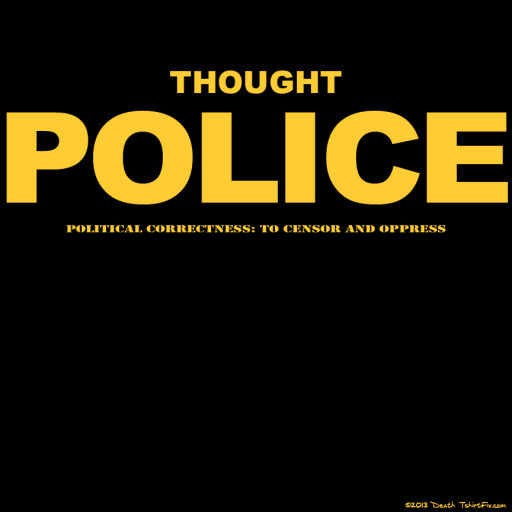 In the ever-closer Orwellian world to which we are gravitating, one wonders if it wouldn’t have been better – rather than canning him – to have Mr. Simoes sent for counselling – a visit to Hydro One’s ‘thought police’. But who is Hydro One to be setting moral standards for its employees anyway, given the recent review of the corporation by the Auditor General. Still, people in glass houses do throw stones – though at least this sends a powerful signal to the thoughtless and insensitive. In the ever-closer Orwellian world to which we are gravitating, one wonders if it wouldn’t have been better – rather than canning him – to have Mr. Simoes sent for counselling – a visit to Hydro One’s ‘thought police’. But who is Hydro One to be setting moral standards for its employees anyway, given the recent review of the corporation by the Auditor General. Still, people in glass houses do throw stones – though at least this sends a powerful signal to the thoughtless and insensitive.
FHRITP. It’s crude, but it is nothing more than a description of the sex act. So it’s not like these dough-brained idiots have just figured out how to split the atom – and thus have earned a right to feel proud of themselves. Perhaps the best thing we could all do is to just ignore them and wait for this banality to go away.
Background links:
FHRITP Firing An Employment Trend
Toronto FC Soccer Hydro One Firing Reporter Confrontation
Female Reporter Challenges Man Apologizes Deserve Firing Calgary Man Fined
Banned From Sports Events Hydro One
 Ray Rivers writes weekly on both federal and provincial politics, applying his more than 25 years as a federal bureaucrat to his thinking. Rivers was a candidate for provincial office in Burlington where he ran as a Liberal against Cam Jackson in 1995, the year Mike Harris and the Common Sense Revolution swept the province. Ray Rivers writes weekly on both federal and provincial politics, applying his more than 25 years as a federal bureaucrat to his thinking. Rivers was a candidate for provincial office in Burlington where he ran as a Liberal against Cam Jackson in 1995, the year Mike Harris and the Common Sense Revolution swept the province.

 By Pepper Parr By Pepper Parr
May 20, 2014
BURLINGTON, ON
First time authors are usually given some room from reviewers. That initial title is looked at for possible potential – maybe this is an author that has more than one story to tell.
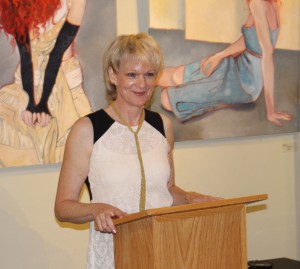 Janet Turpin Meyers, local author launches her first title at the end of the month. Janet Turpin Meyers published “Nightswimming” in 2013 – it was a good read; there was promise and it turned out to be a book that you would both recommend to people and give as a gift to your more discerning friends.
Then book two arrives and it is picked up with both interest and some wondering – what has she had to say this time?
“The Last Year of Confusion” is not “Nightswimming” her first title – it wasn’t supposed to be but for those who so enjoyed Meyers’ first novel there was the hope that this second book would be as pleasurable.
There aren’t as many things to identify with in this second title, at least not for this reader. I was able to identify with many of the “Nightswimming” characters and as I read through that title there was a sense of dread when I began to realize how it was going to end.
No sense of dread with Last Year of Confusion and fewer characters that I identified with – which doesn’t for a moment take away from the book.
When you find yourself with a cast of characters that includes Jesus, John Lennon, Ghandi and Elvis impersonators you know this is going to be different. There are actually two Elvis’s – but I don’t want to give the story away.
When the lead characters have names that are not exactly memorable and bring their own baggage and history to the table – it takes a little adjusting.
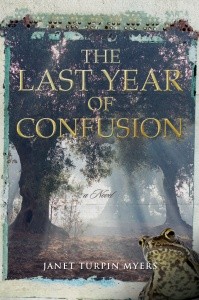 Add in the aboriginal police officer with Bigcanoe as a surname and some difficulty fully comprehending the police policies and procedures and this reader settled into what was going to be a different read. Add in the aboriginal police officer with Bigcanoe as a surname and some difficulty fully comprehending the police policies and procedures and this reader settled into what was going to be a different read.
Add in the Easter Island moai and a character who both counts his blessings and write them up in scribblers he has scrounged and while writing up Blessing # 13,890 easily refers to Blessing # 232
A Time Portal and a “blue suede shoe” plus the television crew from a reality TV show – and you’ve begun to get a sense of where Meyers is going to take you.
This second title is a different read – worth the time if only because it gives you a chance to follow a growing author who is clearly going to be writing for some time.
While not yet recognized there are more books coming from Janet Turpin Meyers.
A reception celebrating the launch of The Last Year of Confusion will be held at Cedar Springs on Sunday May 24th

 By Joe Gaetan By Joe Gaetan
May 16, 2015
BURLINGTON, ON
By Joe Gaetan is like a dog with a bone – he just isn’t going to let it go until he has ever last bit of meat on it. Gaetan has been tracking the progress of the province’s “discussions” and Premier Kathleen Wynne’s statements on any plans to sell Hydro One.
According to a March 10, 2015 CBC report, “Ontario Premier Kathleen Wynne said she hasn’t made any final decisions yet on asset sales, but she did not dispute a report that she is planning to sell shares in Hydro One”.
 There are thousands of Ontarians who don’t think selling Hydro One is a very smart idea. The Premier appears to have already made up her mind. Have you? Fellow Ontarians, in spite of her waffling, Premier Wynne must have been planning something big, because it’s now called Bill 91, The Building Ontario Up Act (Budget Measures), 2015. It’s Current Status, “The Bill has been Ordered referred to Standing Committee pursuant to the Order of the House Standing Committee on Finance and Economic Affairs”.
The purpose of the Act is to implement Budget measures and to enact and amend various Acts. If you feel like reading the lengthy document you will come across sections such as Schedule 1 that deals with making Ontario a more beer friendly province, containing folksy language such as hectoliters, standard bottles of beer, microbrewers, beer, wine and wine coolers.
To pave the way to sell off Hydro One, Wynne apparently knew she had to change a slew of acts such as, The auditor General Act, The Broader Public Sector Accountability Act, The Co-operative Corporations Act, The Financial Accountability Officer Act, The Financial Administration Act, The Freedom of Information and Protection of Privacy Act, The Commodity Futures Act and most importantly The Electricity Act, 1998.
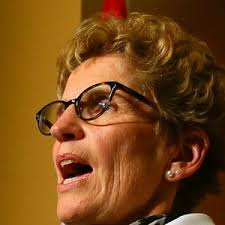 Premier Kathleen Wynne – is she ready to say definitely where she stands on the possible sale of Hydro One? For someone who wasn’t sure on March 10, Premier Wynne sure was busy doing a lot behind the scenes in anticipation of making her final decision found in B91. The piece de resistance of B91 is, Section 48.2 subsection (5), the section that deals with Restrictions on Province’s sale, etc. and specifically where the province,” shall not sell, dispose of or otherwise divest any common shares of Hydro One Inc. if the sale, disposal or divestment would result in the Minister on behalf of Her Majesty in right of Ontario owning a number of common shares that is less than 40 per cent of the outstanding number of common shares of Hydro One Inc.
Premier Wynne “what is it you can’t face”, maybe the truth about selling 60% of Hydro One all along?

 By Ray Rivers By Ray Rivers
May 14, 2015
BURLINGTON, ON
When things go off the rails who do you call? Lisa Raitt, of course. Canada’s transport minister, was the woman on the job at the annual parliamentary press gallery dinner, as she rescued Green Party leader Elizabeth May from herself.
 Fortunately MP Elizabeth May has a good government pension which she will need because she will never make a living as a stand up comic. May, suffering from lack of sleep, had been at the microphone ranting about the sorry state of the fourth (fifth?) political party in Canada. Then she experienced a Rob Ford moment, trying to make something humorous out of Canada’s mistreatment and neglect of native son Omar Khadr. She had planned to play the theme song from a ’70’s sitcom – “Welcome Back Kotter”, and was hauled off the stage while screaming that Khadr had more integrity than the whole ‘f**king’ Harper Cabinet.
It was a dumb trick – no wonder it didn’t work for her. There is absolutely no connection between the fictional teacher Kotter and our child-soldier Khadr. The names are spelled differently and they don’t even sound the same. The crowd watched in disbelief as May’s little stunt collapsed like a deflated balloon. And May then had to be ushered off the stage by fellow east-coaster and parliamentary buddy, Raitt.
The parliamentary press gallery dinners have been troublesome and ofttimes embarrassing for Canada’s leaders over the years since the 1870’s when they first started. The idea of a forum for some good fun involving self-depreciation and ‘roasting’ of political leaders is similar to the US White House Correspondence Dinner, which it pre-dates by almost half a century.
William Lyon MacKenzie King used the event to announce his resignation. Pierre Trudeau apparently hated attending the dinners. Stephen Harper used to attend while in opposition, appearing once as a convincing Darth Vader, perhaps foretelling where he planned to take the nation if elected But he is AWOL now, as PM.
Elizabeth May has had an impressive record as a champion of the environment, even before she came to lead the two-seat Green Party. A one-time advisor to Mulroney’s environment minister Tom McMillan, she was instrumental in the creation of several national parks. May was awarded the the Order of Canada in 2005 and Newsweek magazine named her “one of the world’s most influential women” in 2010.
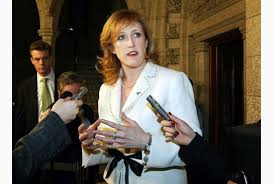 Minister of Transportation Lisa Raitt, got fellow MP Elizabeth May off the stage at a Press Gallery dinner where her speech stunt flopped badly. Her buddy, Lisa Raitt, on the other hand has a more mixed biography, clouded by actions during her time as head of Toronto’s Port Authority. Her tenure as natural resources minister in the Harper Cabinet was awkward, given her unfortunate outburst during the shut down of the reactor at Chalk River. As Labour Minister she is credited with causing an airport workers’ wildcat strike when she called for the RCMP to arrest the workers.
Harper moved Raitt to the transport ministry following the Lac Mégantic train disaster, to give the appearance that his government was doing something. And the government is finally doing something about banning those unsafe tank cars, knowingly used for decades for this dangerous cargo; informing communities when these oil trains pass though; and re-confirming no exemptions for minimum train crews – to help ensure that trains would be properly braked, unlike the one that broke free and crashed, causing the Lac Mégantic tragedy.
Omar Khadr, is the Canadian-born child soldier, shot and captured by American soldiers in Afghanistan, before growing up as an inmate at the US torture academy at Guantanamo Bay. His release on bail was followed by a media conference where he appeared humbled, promising Canadians he’d be a better person. He had been well primed and appeared credible, if not cuddly. Was that the welcome back moment May was championing?
 A boy of 15 on a battlefield where everyone was shooting at everyone gets charged with murder when someone was killed as the result of a grenade the 15 year old boy threw – for this the Canadian government wants to keep him in jail? This one-time child-soldier, born into a politically activist family with roots in the middle east, had spent most of his life somewhere other than Canada. I don’t know if tossing a grenade in self-defence at a gun-fight with American invaders in a lawless country like Afghanistan is much of a crime. But holding children as extra-judicial military prisoners sure is.
In retrospect he probably shouldn’t have been there (Afghanistan), but history will show that neither should the Americans who shot and then held him prisoner for as long as they did. Omar Khadr has had a tough life growing up and had been poorly treated – by the Americans and his own parents – but he is hardly a hero worthy of praise. And while he is now in the country of his birth, Canada is barely his home. No wonder May’s skit flopped.
Background links:
Elizabeth May May and Khadr Lisa Raitt Omar Khadr
Welcome Back Kotter White House Correspondents
 Ray Rivers writes weekly on both federal and provincial politics, applying his more than 25 years as a federal bureaucrat to his thinking. Rivers was a candidate for provincial office in Burlington where he ran as a Liberal against Cam Jackson in 1995, the year Mike Harris and the Common Sense Revolution swept the province. Ray Rivers writes weekly on both federal and provincial politics, applying his more than 25 years as a federal bureaucrat to his thinking. Rivers was a candidate for provincial office in Burlington where he ran as a Liberal against Cam Jackson in 1995, the year Mike Harris and the Common Sense Revolution swept the province.

 By Ray Rivers By Ray Rivers
May 8, 2015
BURLINGTON, ON
They used to say that Ontario would only vote Liberal provincially if the government in Ottawa was Conservative. What does that portend for the upcoming federal election, reviewing the results of this week’s provincial elections in PEI and especially Alberta where the voters turned everything upside down.
PEI wasn’t really much of a surprise and the Liberals barely worked up a sweat, sweeping in to a third majority government in Canada’s tiny province. But Alberta, with over four decades of continuous Conservative government was a ground shaker. It seemed like only yesterday that newly anointed (former) Premier Redford held onto her majority in an election the pollsters said she would surely lose to the Wild Rose Party.
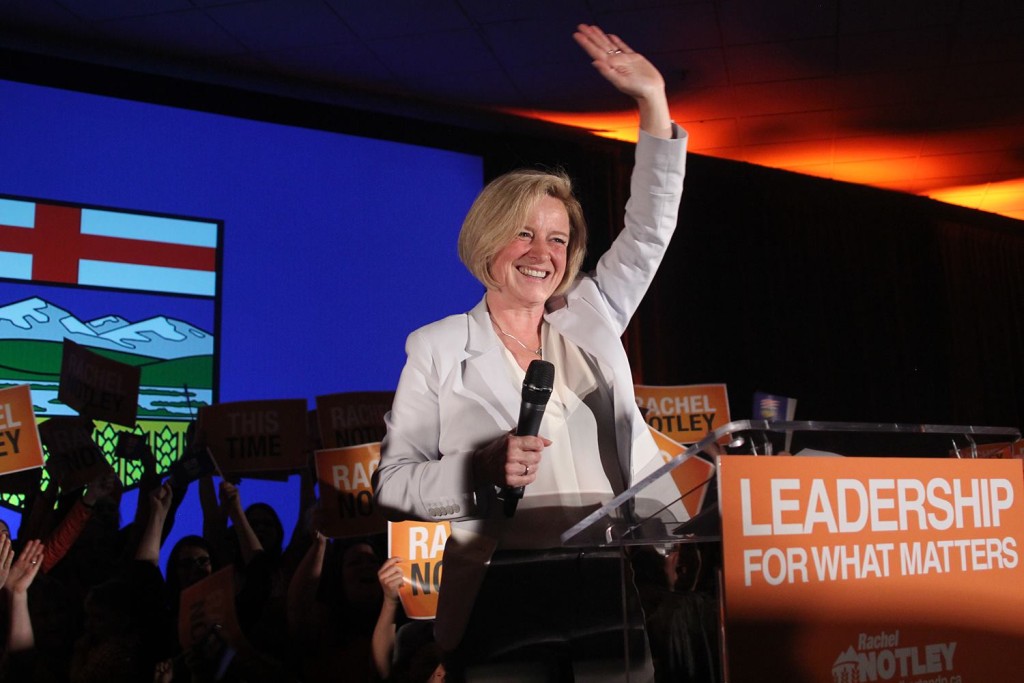 The voters decide – and in Alberta they did so dramatically. Now to figure out what the Alberta change is going to mean to the rest of the country. So when these same pollsters started talking about the NDP winning this time, nobody believed them. But chickens do come home to roost, and partisan loyalty only lasts so long before the people have had enough. Expense scandals, failed economic policies, a deteriorating environment, cuts to health and social services, new taxes, rising unemployment, an arrogant leader (Prentice) and a miserable election campaign brought down this once unassailable dynasty. And in so doing restored our faith in the polls, the pollsters and voters of Albertans.
Nobody likes being lied to. And there was this big lie, that you can have it all. Perpetual wealth with no consequences. Albertans were told to trust their government and it would build a sustainable petroleum-based economy that was going to fuel the greatest boom in Canadian history. An impossible dream, Albertans now realize.
The rewards from all the oil extracted from the ground had been squandered. The big oil corporations and the wealthiest Albertans got theirs, alright. And the rest? Well the premier told Albertans, complaining about its dismal fiscal state, to look in the mirror if they wanted someone to blame.
There may be federal repercussions from this provincial NDP zinger. For one thing, the federal NDP can no longer be discounted as a one-hit-wonder- a flash-in-the-pan – as they show off their official opposition hat. The party with roots in Saskatchewan has held government in several provinces now. And Tom Mulcair has proven a tireless and credible political leader.
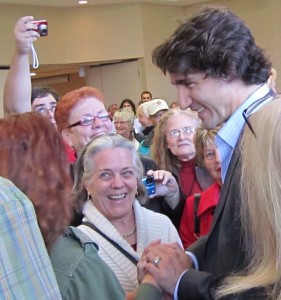 Justin Trudeau on a tour through Burlington – will the charisma hold during the next federal election? And that could mean troubles for Mr. Trudeau’s Liberals, hoping to win a majority government this time around. Two respected parties competing for the same votes in the middle-left may be one party too many to keep Mr. Harper from coming up the middle for another Tory victory, albeit one that is unlikely to be a majority.
Trudeau has dismissed talk of a coalition with the NDP. Despite many common values between the parties there are fundamental philosophical differences, including Jack Layton’s Sherbrooke Declaration, which would allow Quebec to leave on a 51% vote. So it is not a slam-dunk should the votes come in that way. And the last time there was an agreement on a working coalition, some Canadians felt uneasy about any such marriage of convenience.
The Canadian economy is facing tough times ahead. While the federal finance minister was able to scramble together a balanced budget by fire-selling government assets and raiding the unemployment and contingency funds. He’d have trouble the next time around. The reality is that the cash-cow from Alberta has stopped milking and any future Tory budget would have to go back into the ‘red’ unless somebody reforms our tax system.
To that point Mr. Trudeau has just proposed the first significant reform of our income tax system since Brian Mulroney gutted it back in the 1980’s. The one percent (1%) of Canadians, those earning over $200,000, will see their federal rates rise by four percentage points to 33% – a significant rise, though still lower than in the immediate post war period.
This would free up an estimated $3 million of new federal revenue to be re-distributed through tax breaks for the middle class – those with incomes between $40, 000 and $90,000 a year. Re-distribution isn’t a bad word, even though it is multisyllabic and sometimes hyphenated.
 Re-distributing the way Trudeau would do it, rather than the way Harper has been doing it will mean new economic growth, driven by the middle class as opposed to being left in the Tax Free Savings Accounts of the one-per-cent crowd. And that makes us all better off. Recall US President Harry Truman’s notable saying that if you want to live like a Republican you’d better vote for a Democrat. Re-distributing the way Trudeau would do it, rather than the way Harper has been doing it will mean new economic growth, driven by the middle class as opposed to being left in the Tax Free Savings Accounts of the one-per-cent crowd. And that makes us all better off. Recall US President Harry Truman’s notable saying that if you want to live like a Republican you’d better vote for a Democrat.
The upcoming federal election is still a crap shoot, but becoming more interesting every day as October draws near. Few people are expecting the NDP to pull another rabbit out the hat and actually form the national government, let alone with a majority.
But look at Alberta.
Background:
Alberta Election Issues How Albertans Felt Trudeau Tax Plan PEI Results Federal Raids
Election Background NDP Sweep Alberta Premiers A Timely Change
 Ray Rivers writes weekly on both federal and provincial politics, applying his more than 25 years as a federal bureaucrat to his thinking. Rivers was a candidate for provincial office in Burlington where he ran as a Liberal against Cam Jackson in 1995, the year Mike Harris and the Common Sense Revolution swept the province. Ray Rivers writes weekly on both federal and provincial politics, applying his more than 25 years as a federal bureaucrat to his thinking. Rivers was a candidate for provincial office in Burlington where he ran as a Liberal against Cam Jackson in 1995, the year Mike Harris and the Common Sense Revolution swept the province.

 By Pepper Parr By Pepper Parr
May 7, 2015
BURLINGTON, ON
Ward 2 Councillor Marianne Meed Ward has always believed that citizens should be engaged much earlier in the decision making process than the city’s current policies require.
When changes are being made many people feel that the die has been cast and the politicians just want the voters to say they like what has already been decided upon.
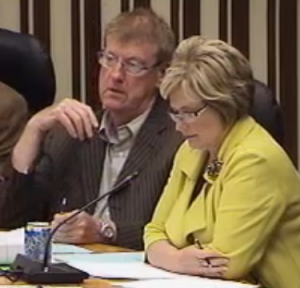 Councillors Sharman and Lancaster: both part of the Shape Burlington committee who seem to have forgotten what the report was all about – civic engagement That is the style we see from Councillors Craven, Sharman and Lancaster. Councillors Taylor and Dennison tend to show some flexibility.
The Mayor tends to sit between the two groups. He gets keen on an idea and sticks with it – but when there is significant blow back – he backs away. Bicycle lanes on Lakeshore Road is perhaps his worst example – taking the wind turbine was another.
Burlington’s approach to civic engagement hasn’t gotten far beyond approving, unanimously, the Shape Burlington report and putting an “in principle” community engagement document in place but then never acting on it.
 Vanessa Warren on the right wanted to know why residents were not permitted to have real input on the creation on the city budget – she didn’t like the idea of reading through a document with decisions already made set out for her. During the public budget deliberations in 2013, Vanessa Warren, who was just beginning to come to the attention of the public, asked at a meeting at the Art Gallery, why the public wasn’t seeing the numbers when they were being put together. She objected to having to look at numbers and get to make a comment and then go home – with nothing changing.
Meed Ward wants to do it differently. Her first reference is usually to her constituents – who meet almost as community council. She listens, is frequently surprised at what she hears from her constituents and then makes changes.
Attend a ward 1 or a ward 6 community meeting and watch the flow of information and ideas – they go in just the one direction. These are the fundamental differences in how Councillors Sharman, Meed Ward and Craven see their jobs.
The older members of the population are content with leaving everything in the hands of the politicians – that was their experience and they are comfortable with that approach.
There is a younger generation that doesn’t buy into that top down approach. They are comfortable with searching out their own information and will debate with their council member.
The two groups in ward 5 who were very unhappy with the way their Council member represented them with the sewer back up problems that did serious damage to their homes made their views known frequently. They didn’t believe they were being heard and went off on their own.
Sharman for his part was very sincere in his efforts to do something for his constituents – it was a matter of very different operational styles. Sharman prefers command – the residents prefer collaboration – not Mr. Sharman’s strong point.
Meed Ward has invited residents to participate in a series of workshops that will see major downtown land owners, city staff, businesses and residents meet to discuss the future of their downtown.
 Meed Ward used up her postage budget for the year in her first three months as a Council member. Her style is to get information out to people. What Meed Ward has managed to do is pull the people who own the land into the discussion – let them hear what residents would like to see. The smarter developers listen to residents and bring them on side – it does away with loud, noisy contentious public meetings.
The Molinaro’s learned the hard way with their Brock Street condominium that it is better to work with residents than fight them. When they moved forward with their Fairview Road – five tower – Paradigm project they worked with the community and with the residents – guess what – no noisy contentious public meetings.
The ADI Development Group decided from the GetGo that they would bull their way through the city planning department and city council and get themselves before the OMB where they think they have a better chance of getting a 28 storey tower on a plot of land less than an acre in size approved. They just might be right.
Meed Ward arranged for a public meeting on the expansion and significant upgrade to Brant Square Plaza. The project met all the zoning requirements; they could have asked for more height but chose not to.
Meed Ward takes the view that all the decisions and as much information as possible should be run by the citizens. Petty power politics isn’t her game.
The workshops will allow participants to provide input into what they think the downtown should look like in the future.
The first workshop takes place on May 13 at Burlington Lion’s Club Hall beginning at 7 p.m. and will have city planners sharing information about existing city policies and what’s up for review.
Participants will also start to map out principles around design, compatibility, height, density, heritage, jobs, and more.
 Citizens at a public budget meeting – they get to comment – they don’t get to demand that changes be made. The meetings are more of a public relations exercise. “Residents want to be involved in downtown development early on,” said Meed Ward. “This approach brings together all stakeholders to collectively and collaboratively shape the future of our downtown.”
Seating is limited for the May 13 workshop. For more information and to register, please contact Georgie Gartside, Assistant to Councillors, at georgie.gartside@burlington.ca or 905-335-7600, ext. 7368.
This is an approach that most of Burlington doesn’t benefit from – with the exception of Councillor Taylor who has a long standing working relationship with his community.

 By Pepper Parr By Pepper Parr
May 6, 2015
BURLINGTON, ON
It’s always close to the same number – something around the 35% plus number. That being the percentage of the trucks pulled over for safety inspection.
 When more than a third of those pulled over fail the tests and 15 trucks are actually taken off the road – those roads are not safe. When more than a third of those pulled over fail the tests and 15 trucks are actually taken off the road – those roads are not safe.
 Lots of paper work when a truck gets taken off the road – money well spent. Get tougher. Yesterday the Halton Regional Police Service in partnership with Peel Regional Police, Ministry of Transportation, Ministry of the Environment and the Region of Halton conducted a Commercial Vehicle Safety Initiative.
The focus of the blitz was to identify vehicles that may not be properly maintained and could pose a danger on our roads.
In total 40 commercial vehicles were inspected resulting in:
• 70 provincial offence notices issued
• 15 vehicles removed from service
• 38% failure rate
Tougher crackdown on these people – raise the stakes – impound the trucks for a week. Let the carriers unload the products they are hauling and send a warning letter and a liability notice to the company that hired the truck – make it clear – this is not going to be tolerated.
The association of police chiefs are not shy when it comes to getting their message out. Get this message out – our roads are going to be safe.
 When police catch this – take the car off the road and send the driver home in a cab. Don’t get me going on the nut cases that drive with the cell phone in their hands. $2500 fine and they have to call a taxi to get home; impound the car and if there are children in it – call Child Services.
The police want anyone who kills a police officer in jail for life – that issue is important to them. Safe roads are important to the people who drive them. Crack down
Day two of Operation Tag and Tow will take place in Oakville on May 7th, 2015.

|
|
 By Pepper Parr
By Pepper Parr



















 As we move closer towards a critical election in just over 100 days this might be a good time to reflect on the Canada you want and which government you believe will get us all there.
As we move closer towards a critical election in just over 100 days this might be a good time to reflect on the Canada you want and which government you believe will get us all there.















 Ray Rivers writes weekly on both federal and provincial politics, applying his more than 25 years as a federal bureaucrat to his thinking. Rivers was a candidate for provincial office in Burlington where he ran as a Liberal against Cam Jackson in 1995, the year Mike Harris and the Common Sense Revolution swept the province.
Ray Rivers writes weekly on both federal and provincial politics, applying his more than 25 years as a federal bureaucrat to his thinking. Rivers was a candidate for provincial office in Burlington where he ran as a Liberal against Cam Jackson in 1995, the year Mike Harris and the Common Sense Revolution swept the province. 
 On Sunday June 28, 2015, a significant number of service members will be attending the PRIDE parade to march alongside our decorated cruiser. We look forward to joining many other police and emergency services, coming together to support, encourage and promote inclusivity for our LGBTQ+ community.
On Sunday June 28, 2015, a significant number of service members will be attending the PRIDE parade to march alongside our decorated cruiser. We look forward to joining many other police and emergency services, coming together to support, encourage and promote inclusivity for our LGBTQ+ community.











 But Canada’s hockey-author, our PM, is just not into the game when it comes to protecting the atmosphere. He was an ardent climate change denier in his opposition days. And his government has stayed pretty true to form on that count. So even if individual Canadians wanted to contribute to the fight against climate change they are leaderless.
But Canada’s hockey-author, our PM, is just not into the game when it comes to protecting the atmosphere. He was an ardent climate change denier in his opposition days. And his government has stayed pretty true to form on that count. So even if individual Canadians wanted to contribute to the fight against climate change they are leaderless. We asked why. The caller explained that the person was looking for a job and was worried that someone would do an online search and come across the comment and that it would reflect negatively on that person.
We asked why. The caller explained that the person was looking for a job and was worried that someone would do an online search and come across the comment and that it would reflect negatively on that person.












 One of the louts, Shawn Simoes, sporting an Emirates shirt, took up the reporter’s challenge. His face was later recognized by his employer, Hydro One, and he was promptly given his walking papers. Of course, the firing gave this cycle of idiocy even more life, like gasoline on a fire, as Liberal and NDP leaders lowered themselves by chiming-in with their support for the firing.
One of the louts, Shawn Simoes, sporting an Emirates shirt, took up the reporter’s challenge. His face was later recognized by his employer, Hydro One, and he was promptly given his walking papers. Of course, the firing gave this cycle of idiocy even more life, like gasoline on a fire, as Liberal and NDP leaders lowered themselves by chiming-in with their support for the firing. In the ever-closer Orwellian world to which we are gravitating, one wonders if it wouldn’t have been better – rather than canning him – to have Mr. Simoes sent for counselling – a visit to Hydro One’s ‘thought police’. But who is Hydro One to be setting moral standards for its employees anyway, given the recent review of the corporation by the Auditor General. Still, people in glass houses do throw stones – though at least this sends a powerful signal to the thoughtless and insensitive.
In the ever-closer Orwellian world to which we are gravitating, one wonders if it wouldn’t have been better – rather than canning him – to have Mr. Simoes sent for counselling – a visit to Hydro One’s ‘thought police’. But who is Hydro One to be setting moral standards for its employees anyway, given the recent review of the corporation by the Auditor General. Still, people in glass houses do throw stones – though at least this sends a powerful signal to the thoughtless and insensitive.

 Add in the aboriginal police officer with Bigcanoe as a surname and some difficulty fully comprehending the police policies and procedures and this reader settled into what was going to be a different read.
Add in the aboriginal police officer with Bigcanoe as a surname and some difficulty fully comprehending the police policies and procedures and this reader settled into what was going to be a different read.








 Re-distributing the way Trudeau would do it, rather than the way Harper has been doing it will mean new economic growth, driven by the middle class as opposed to being left in the Tax Free Savings Accounts of the one-per-cent crowd. And that makes us all better off. Recall US President Harry Truman’s notable saying that if you want to live like a Republican you’d better vote for a Democrat.
Re-distributing the way Trudeau would do it, rather than the way Harper has been doing it will mean new economic growth, driven by the middle class as opposed to being left in the Tax Free Savings Accounts of the one-per-cent crowd. And that makes us all better off. Recall US President Harry Truman’s notable saying that if you want to live like a Republican you’d better vote for a Democrat.







